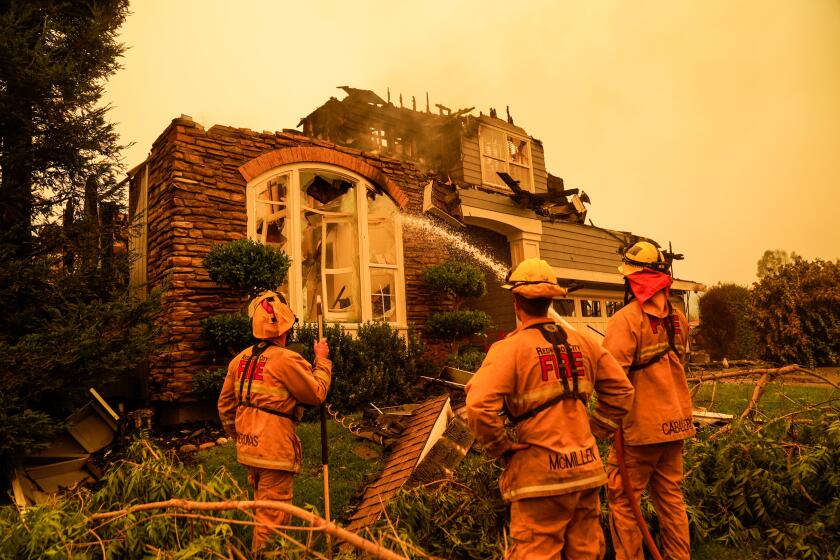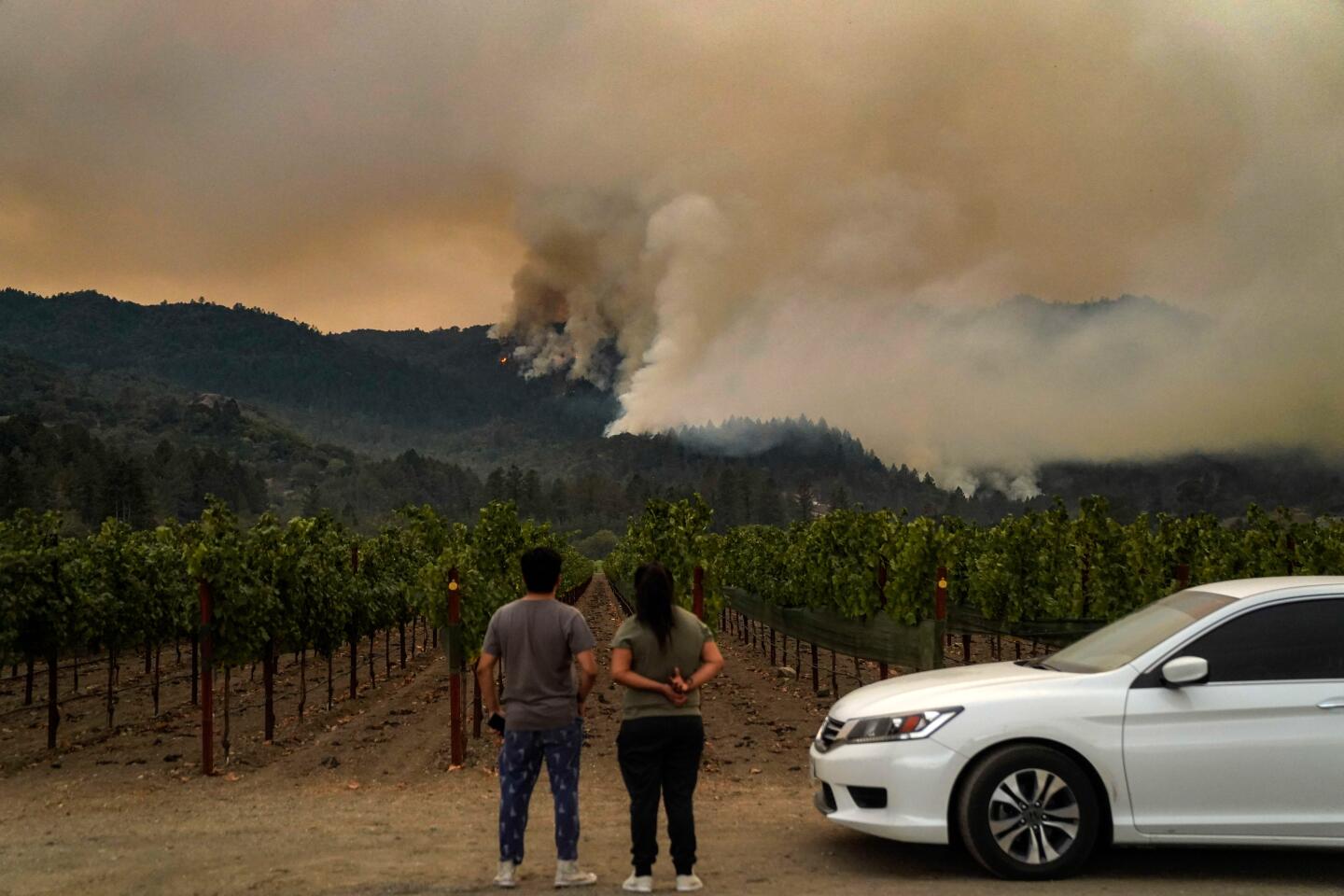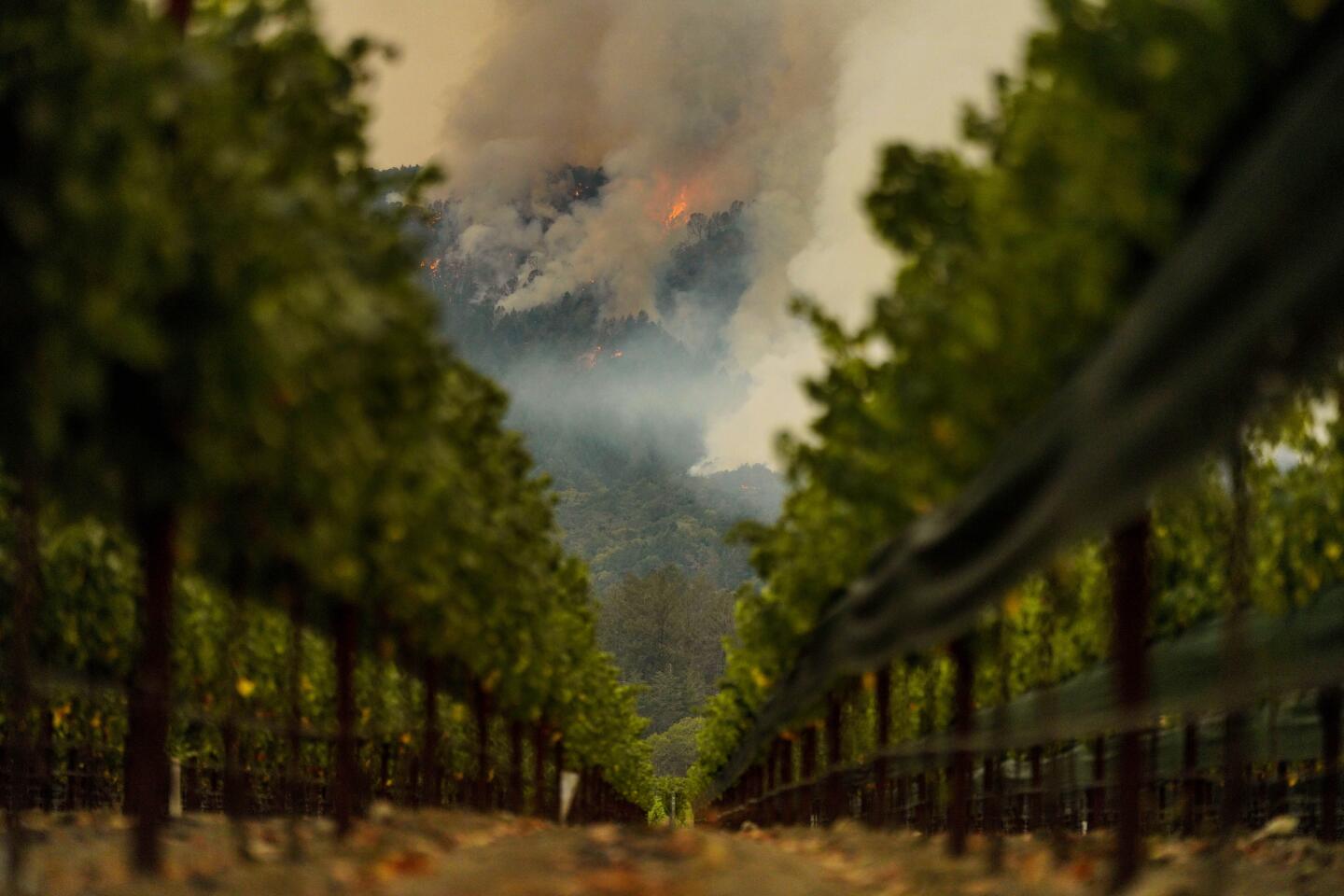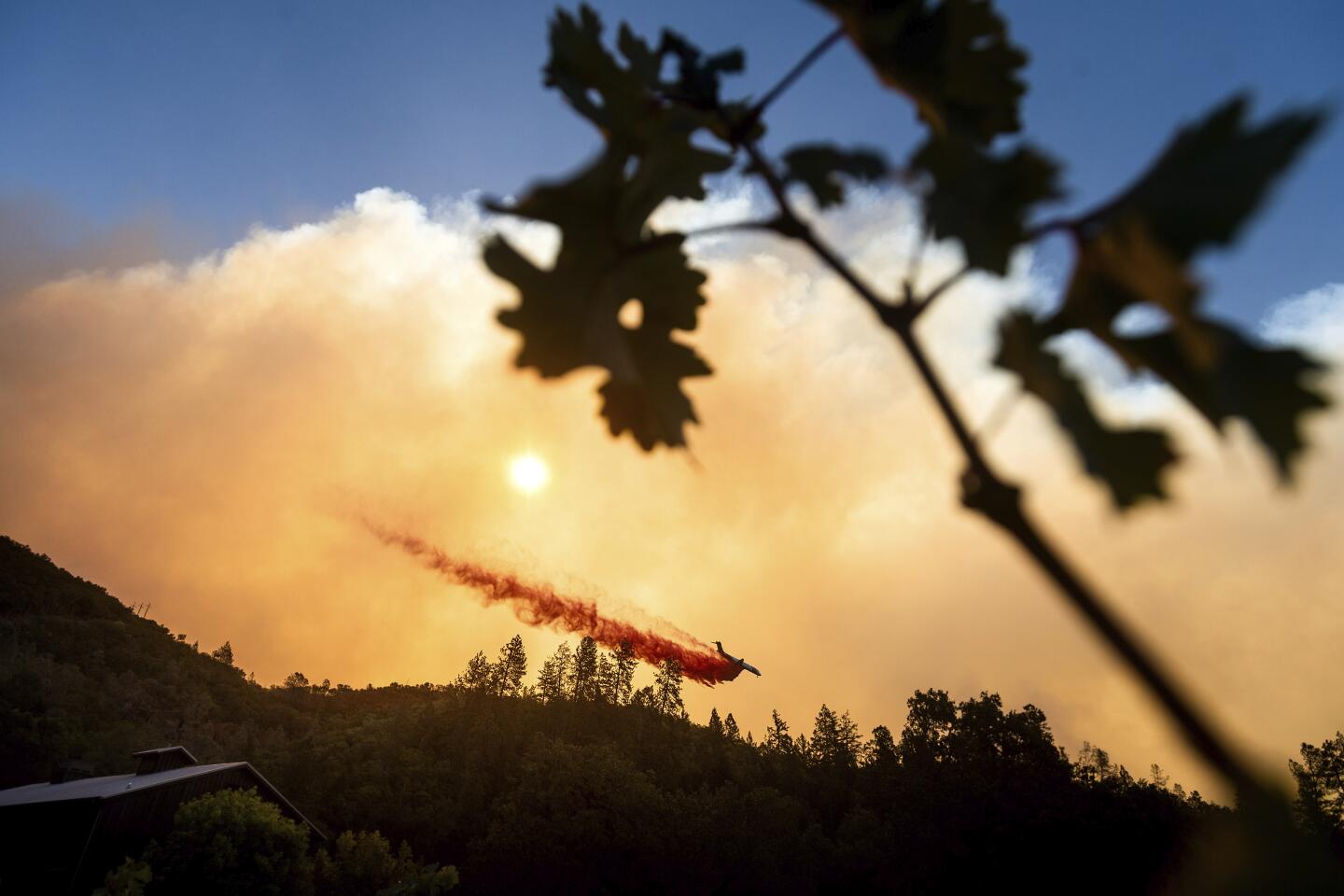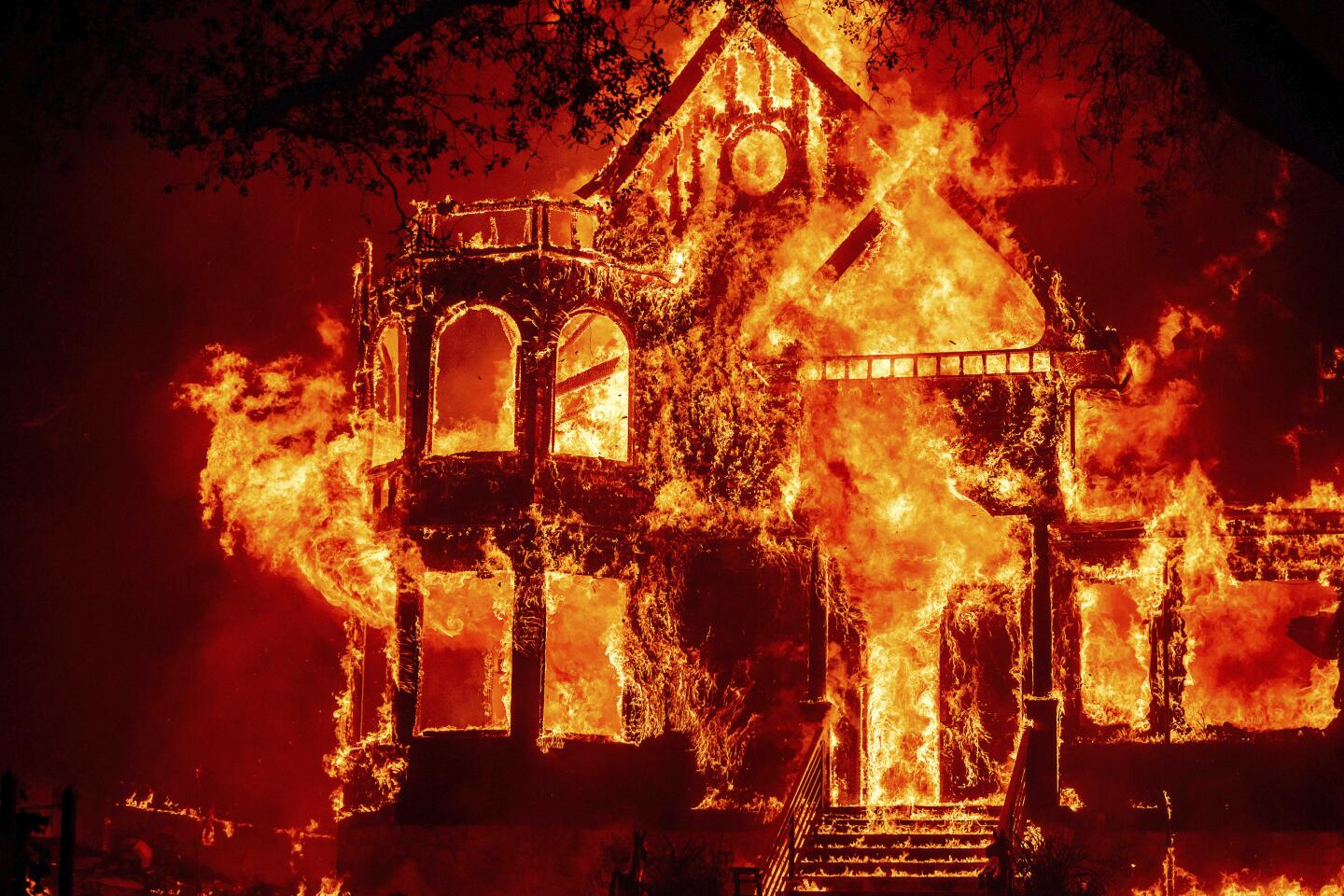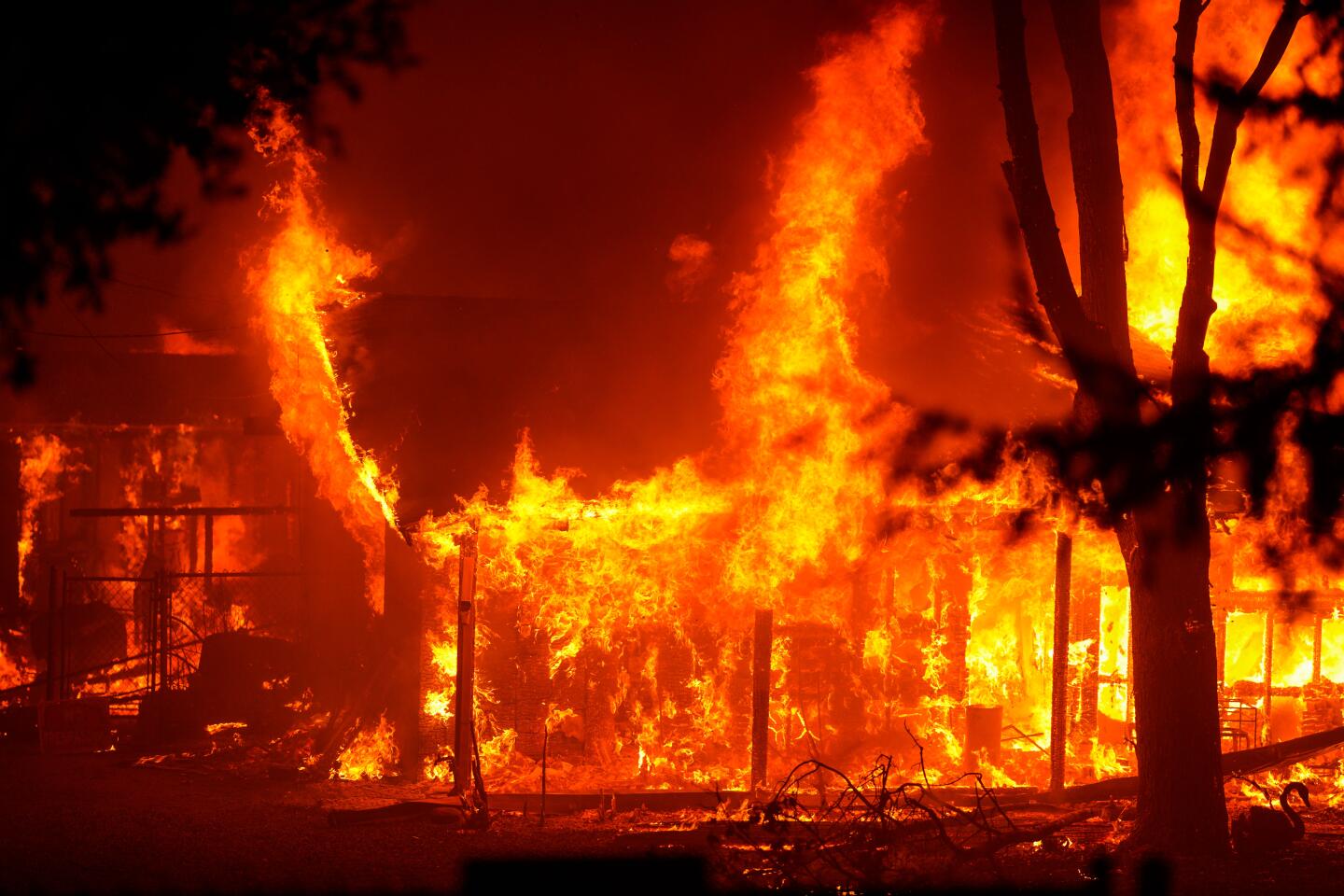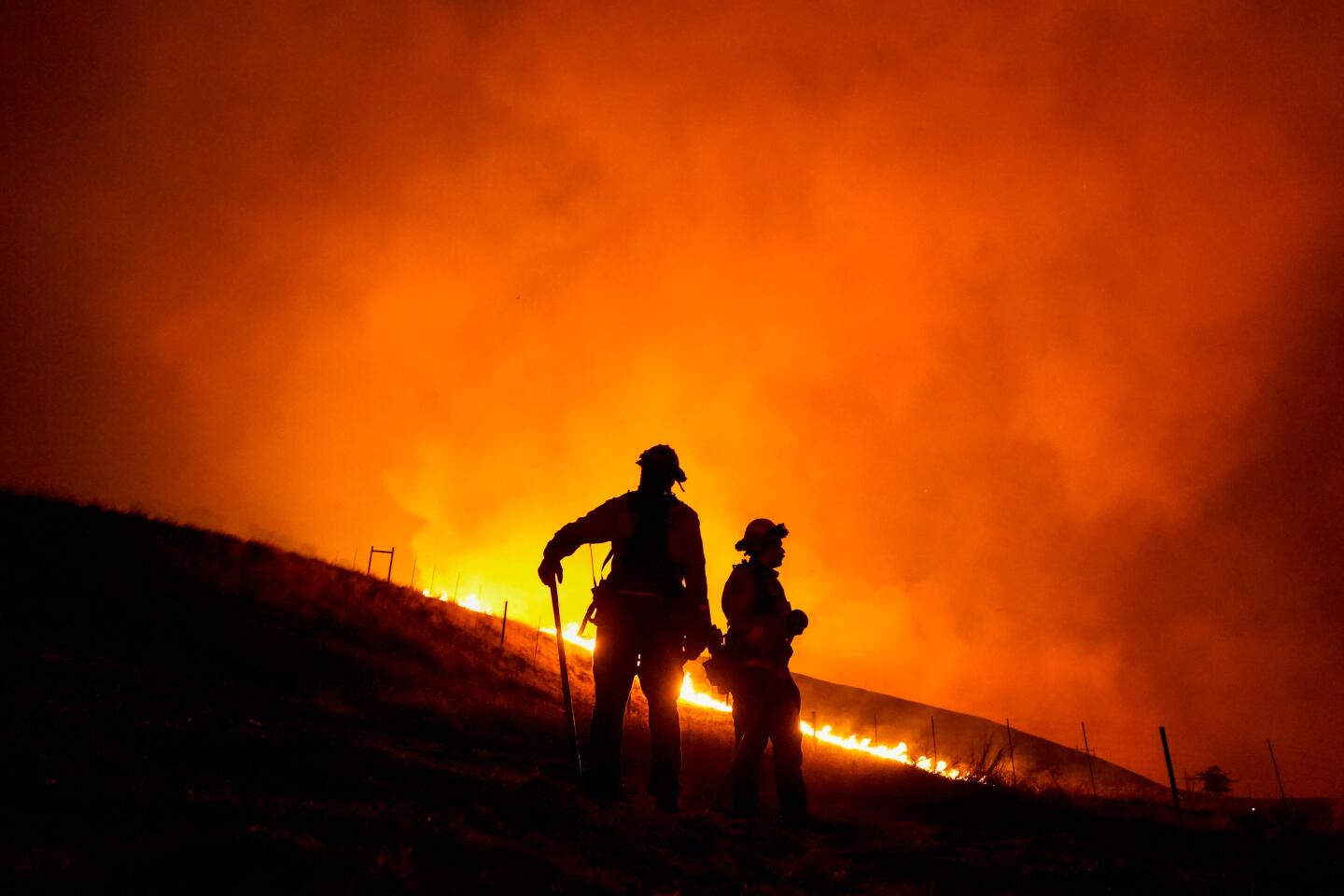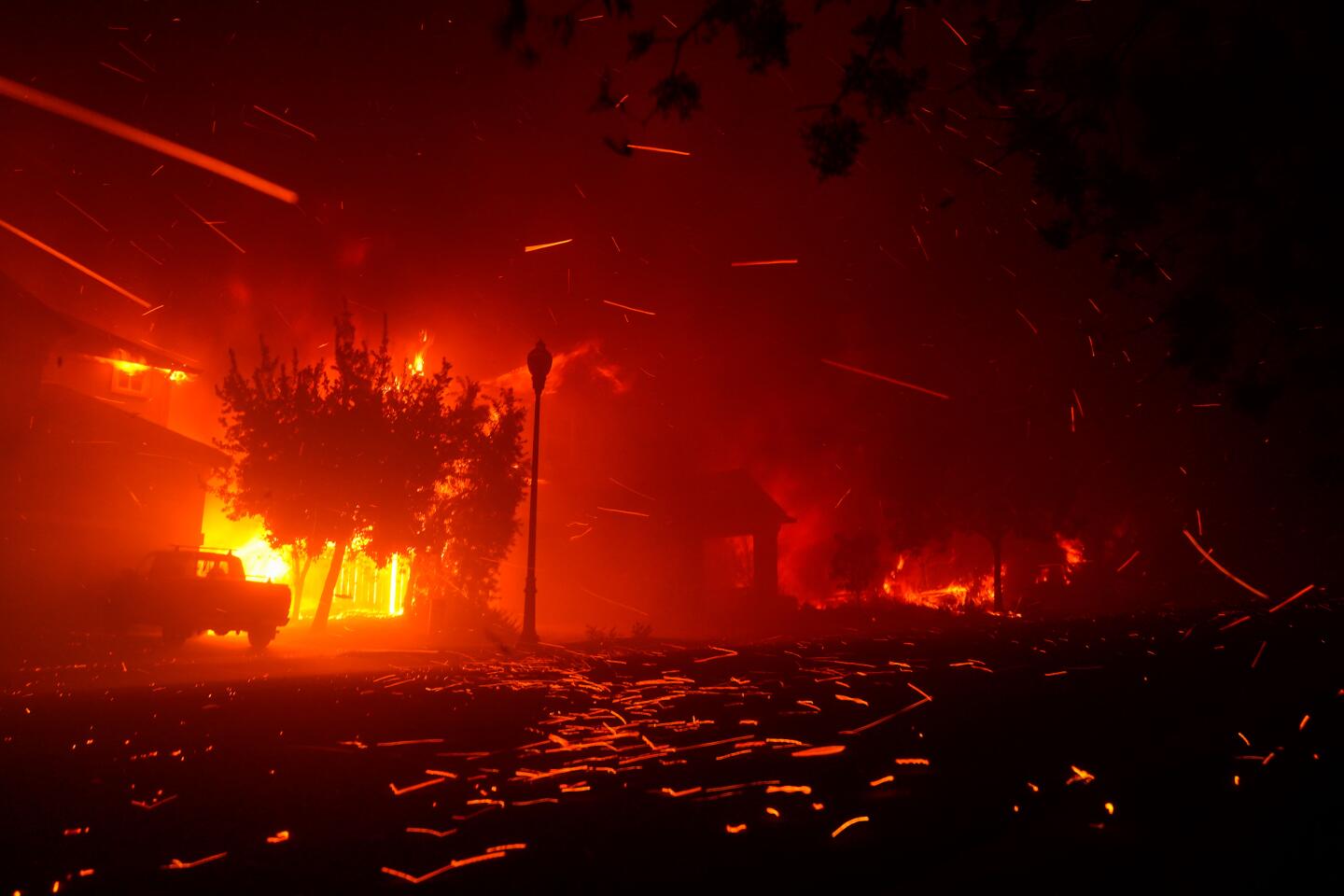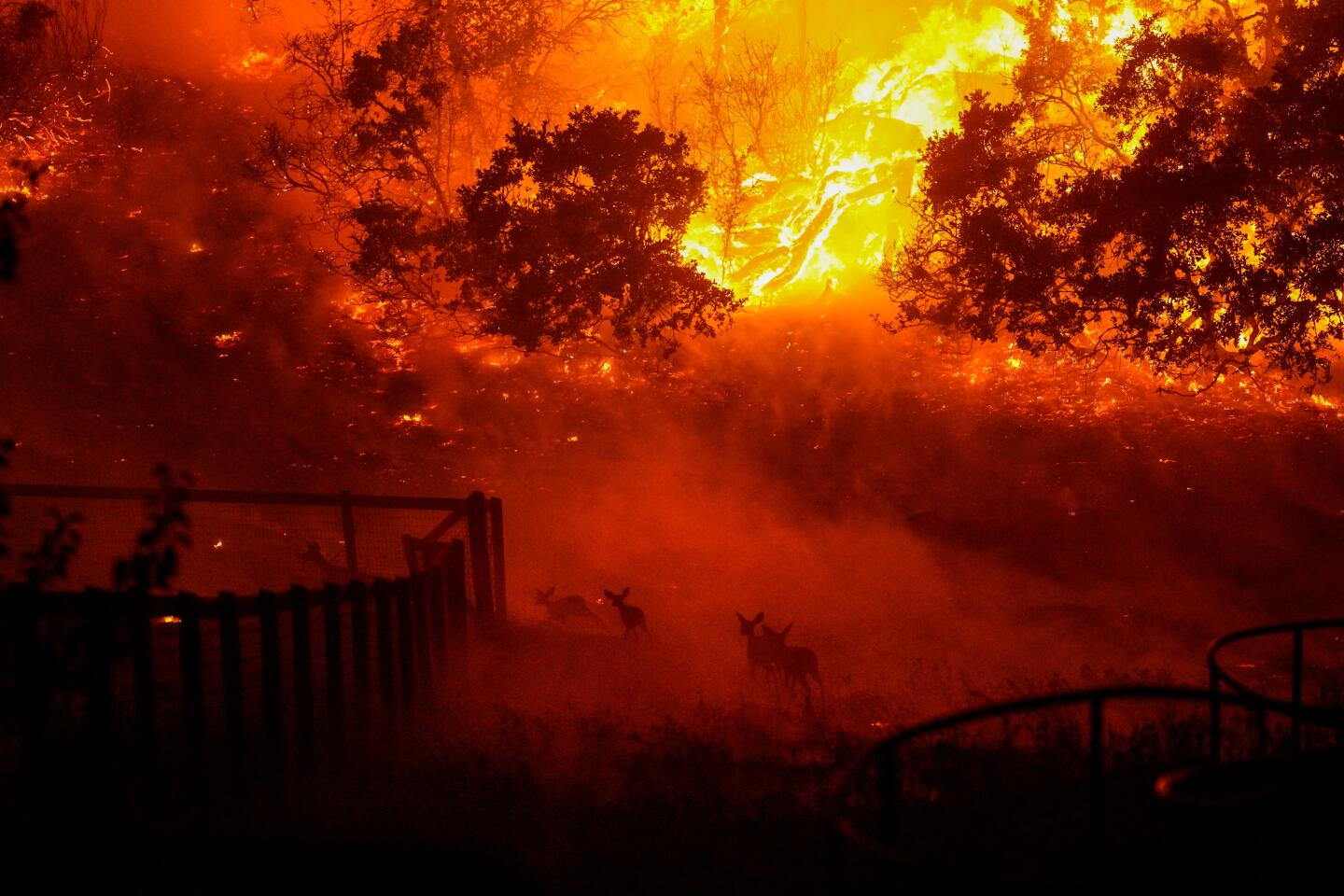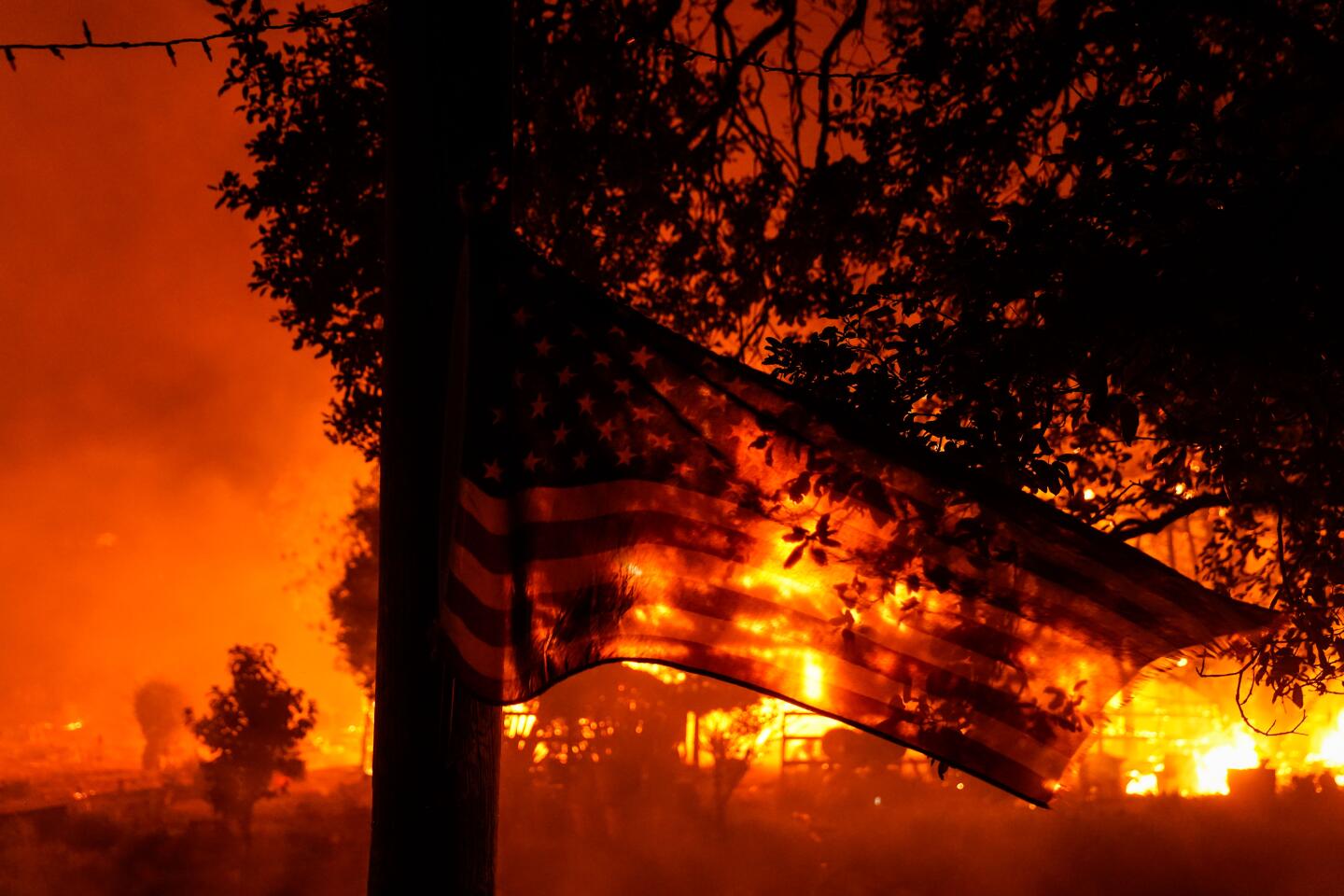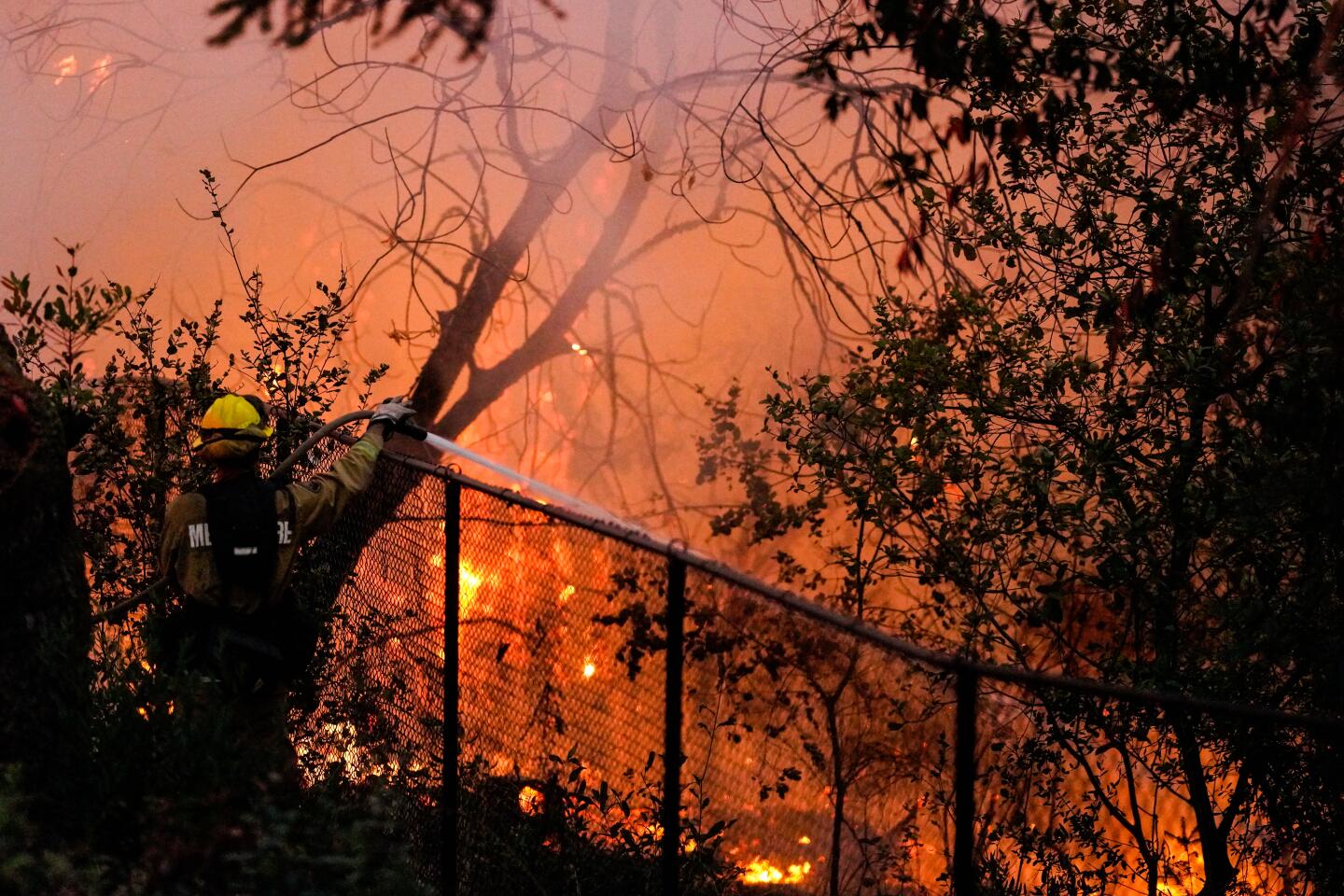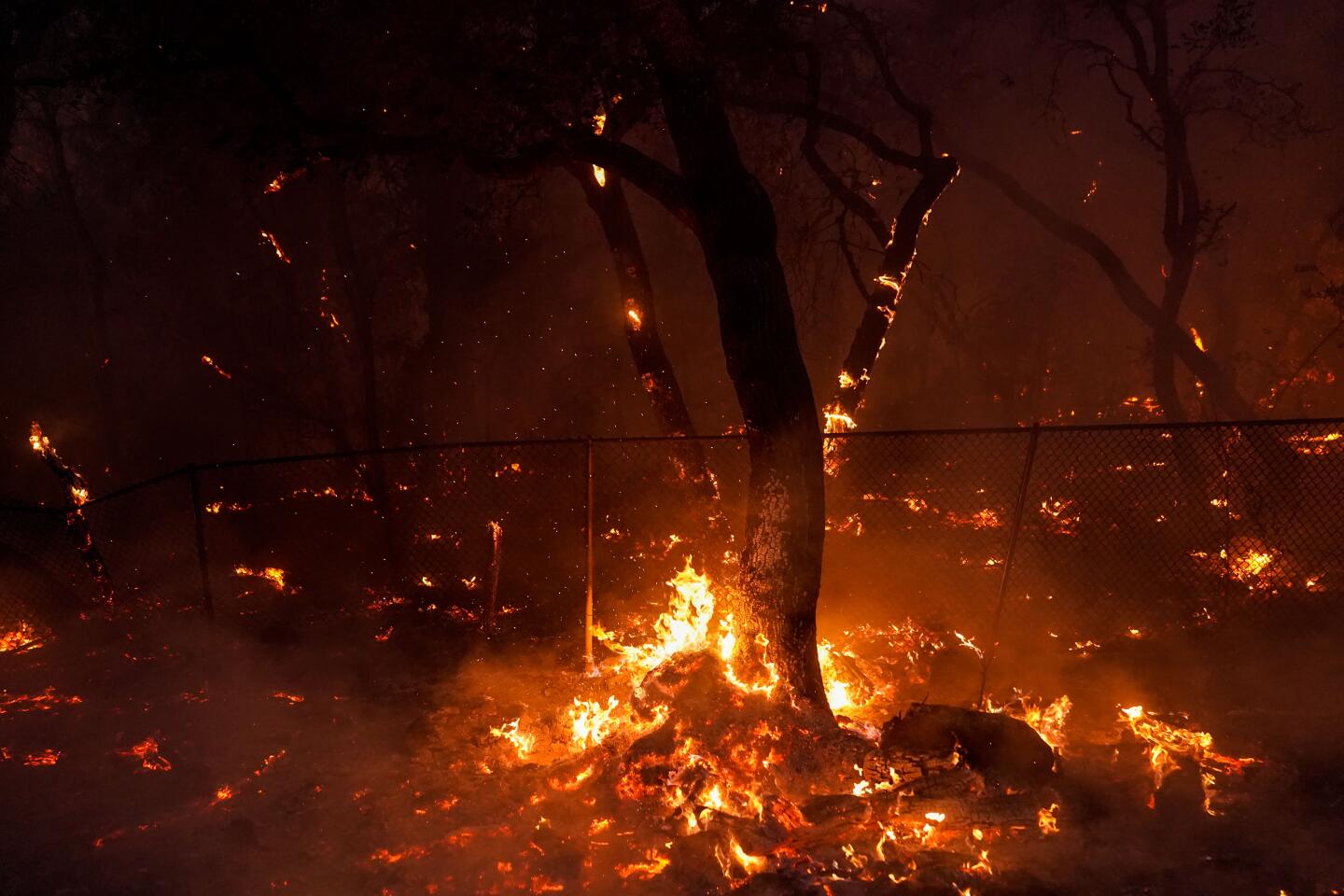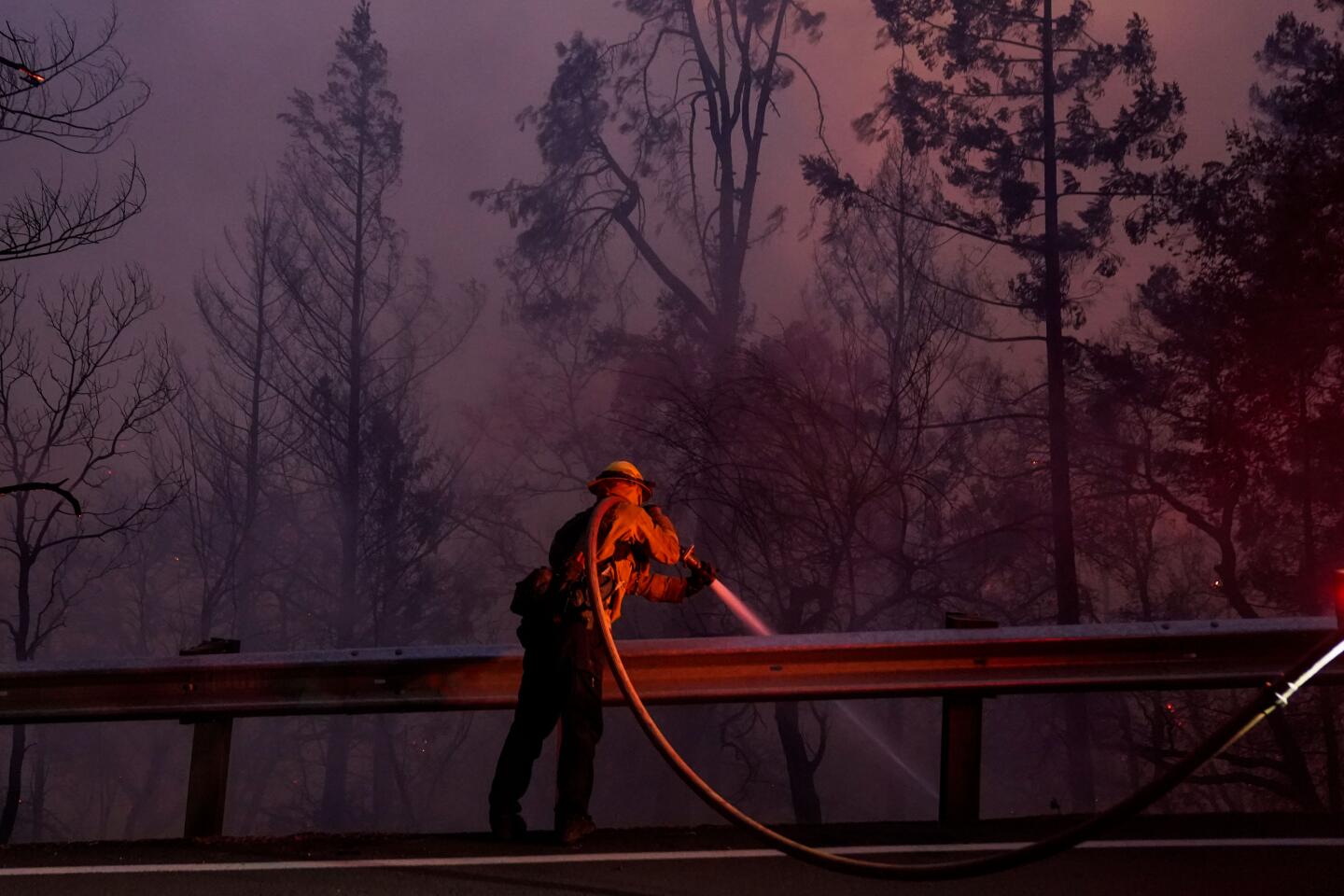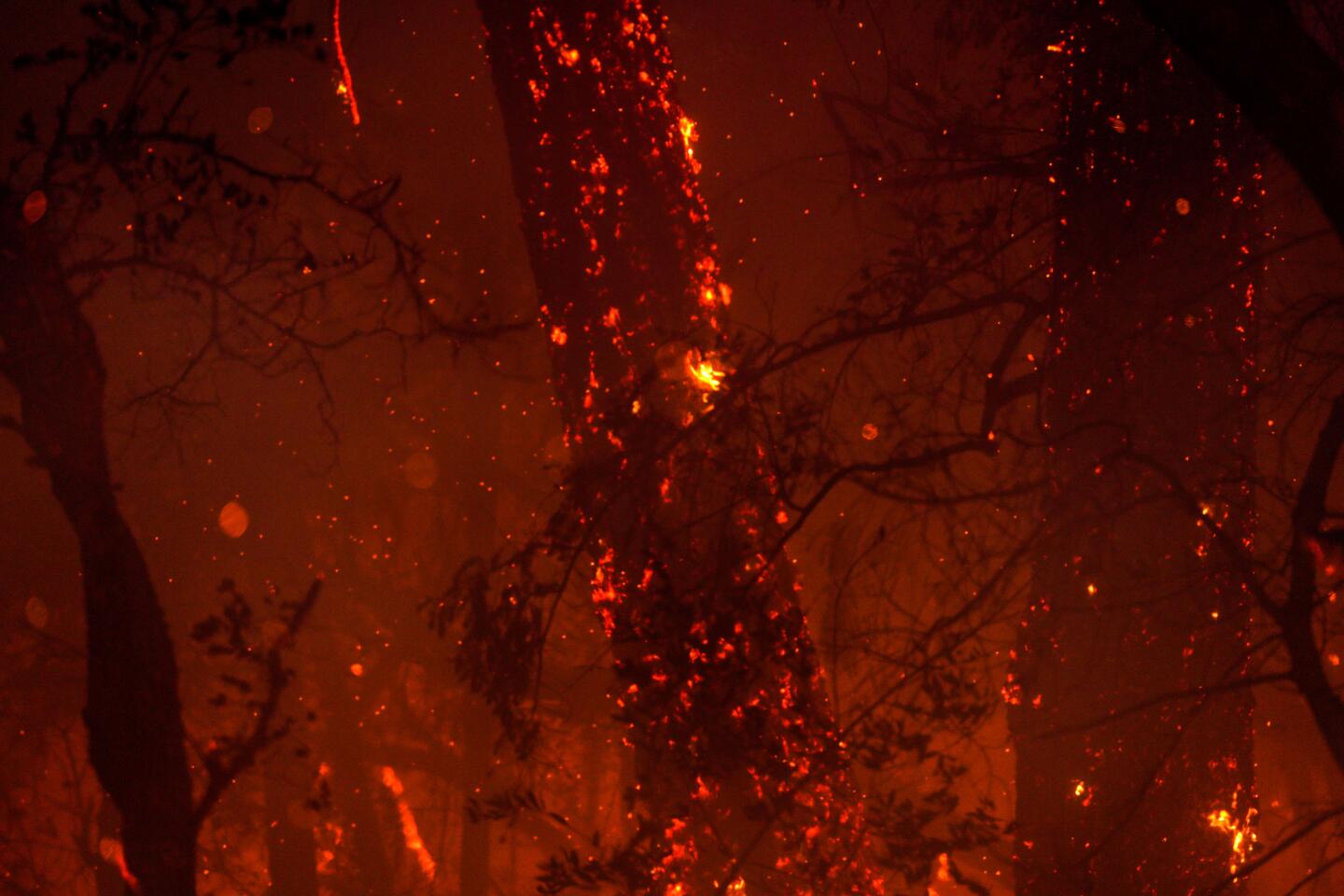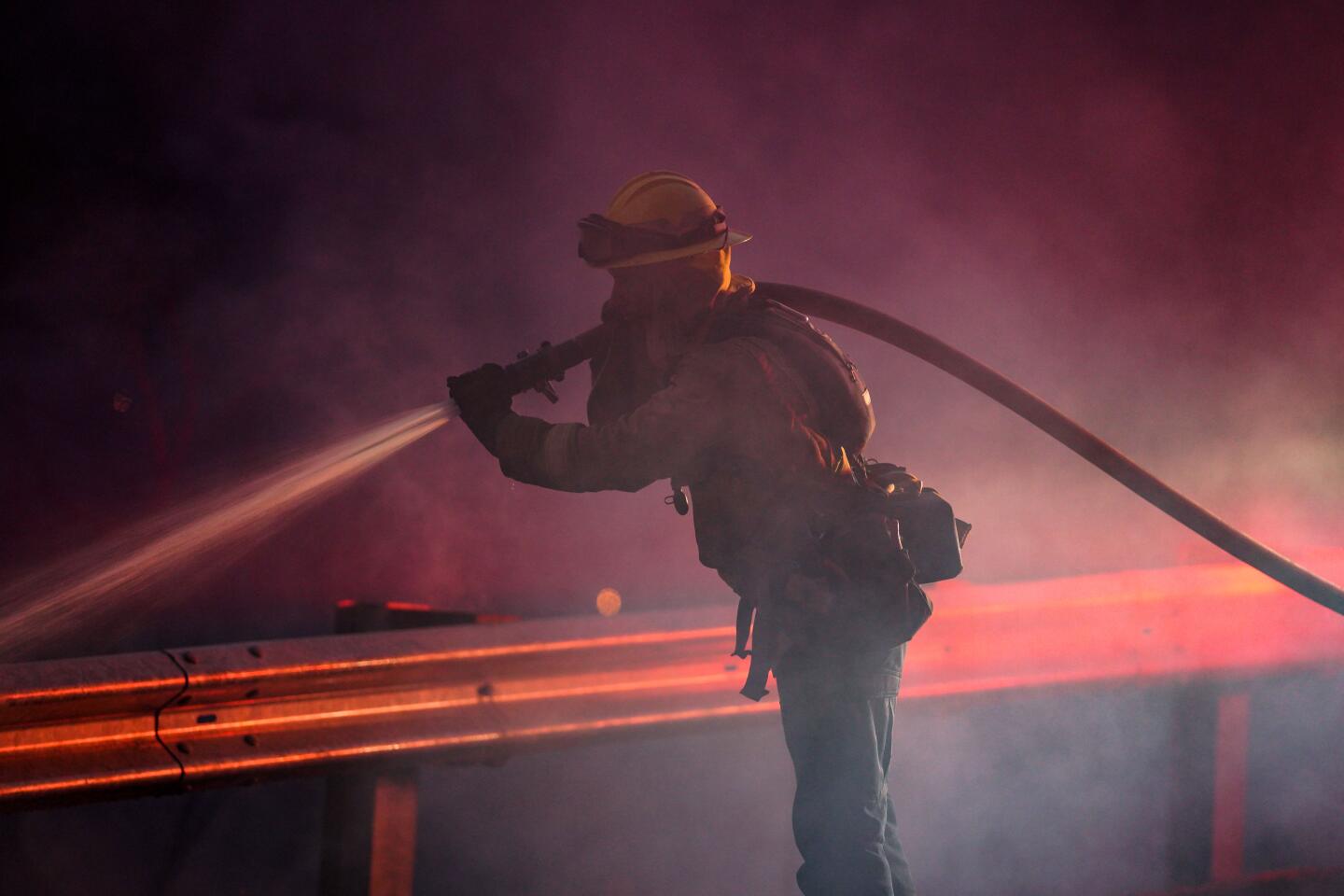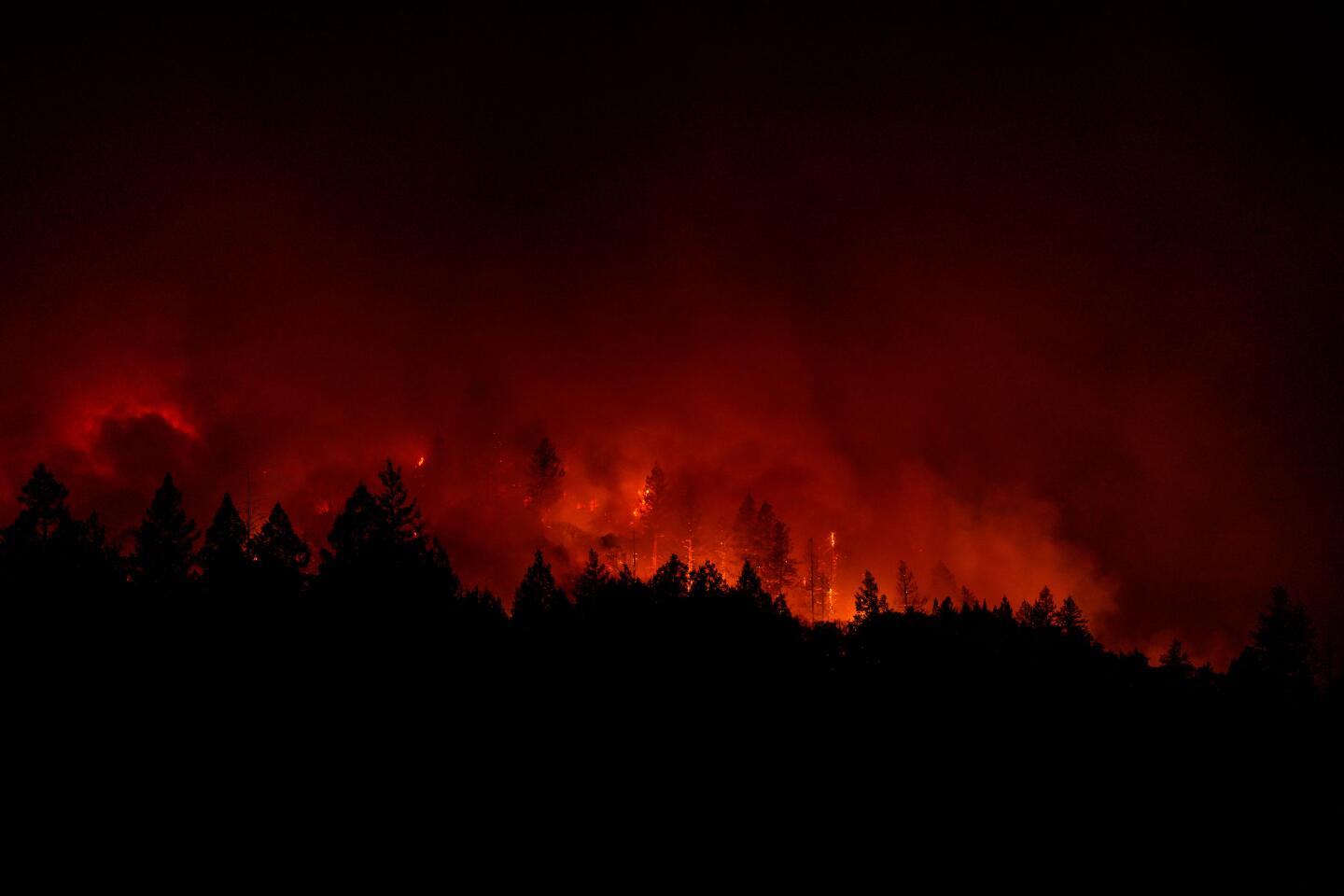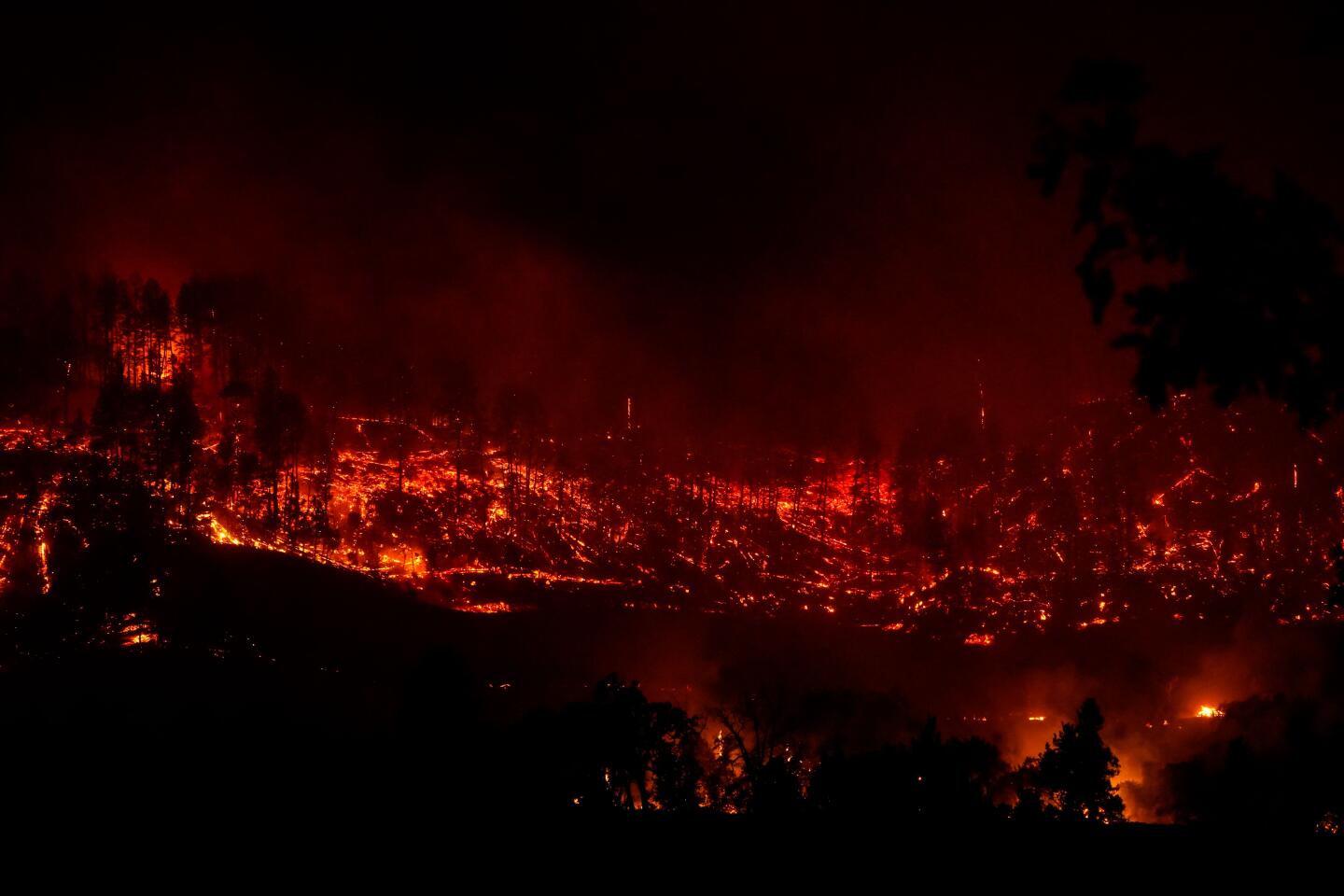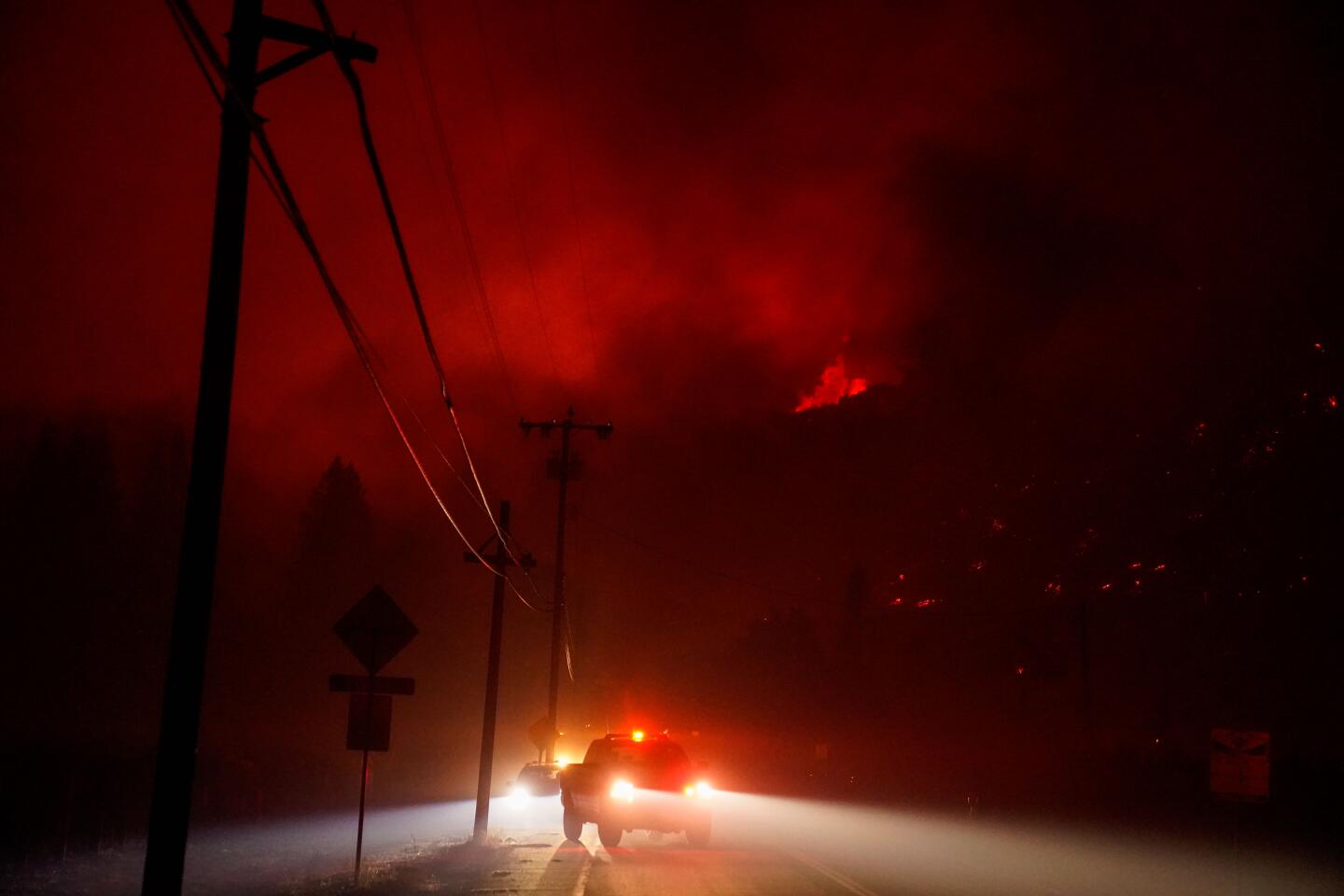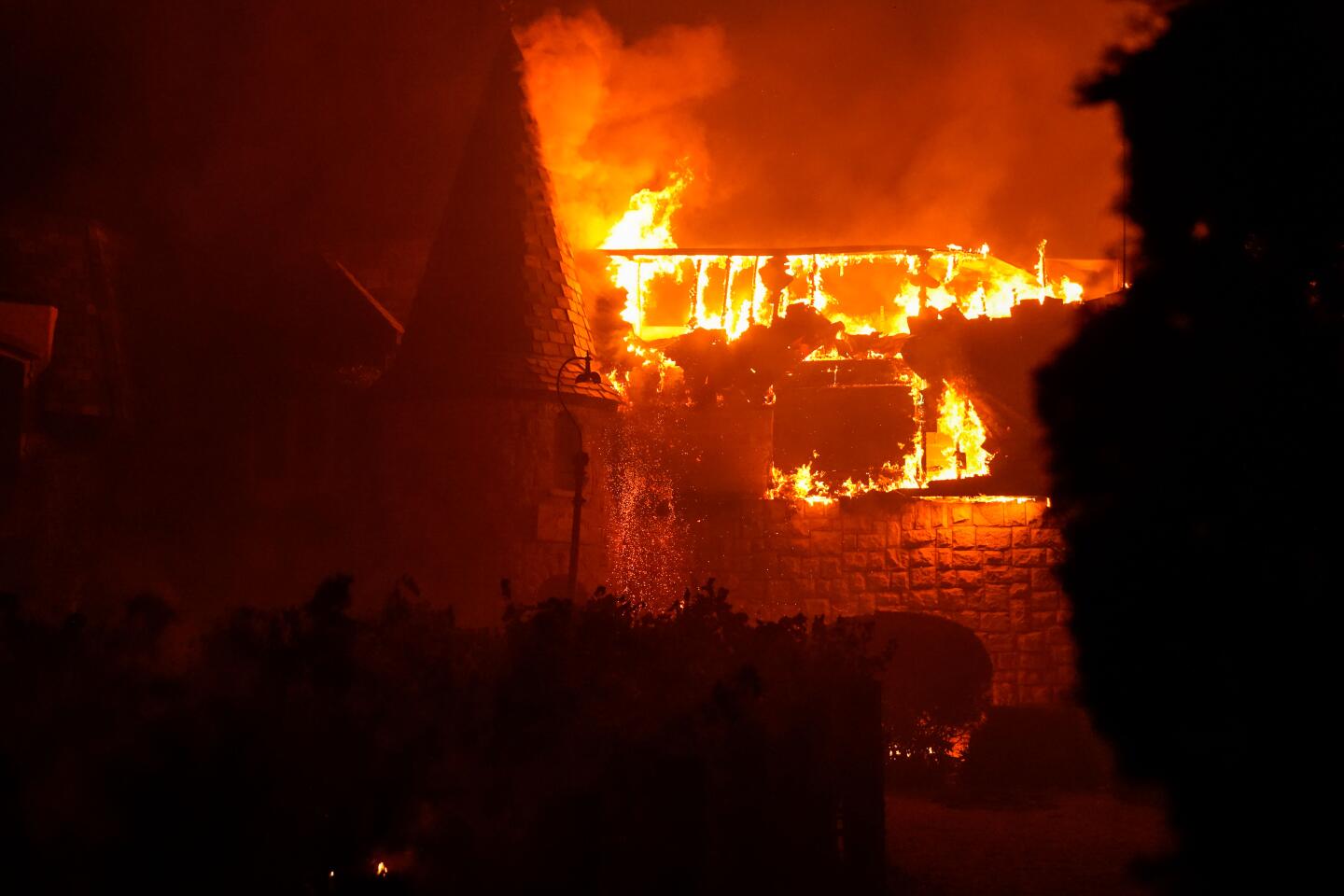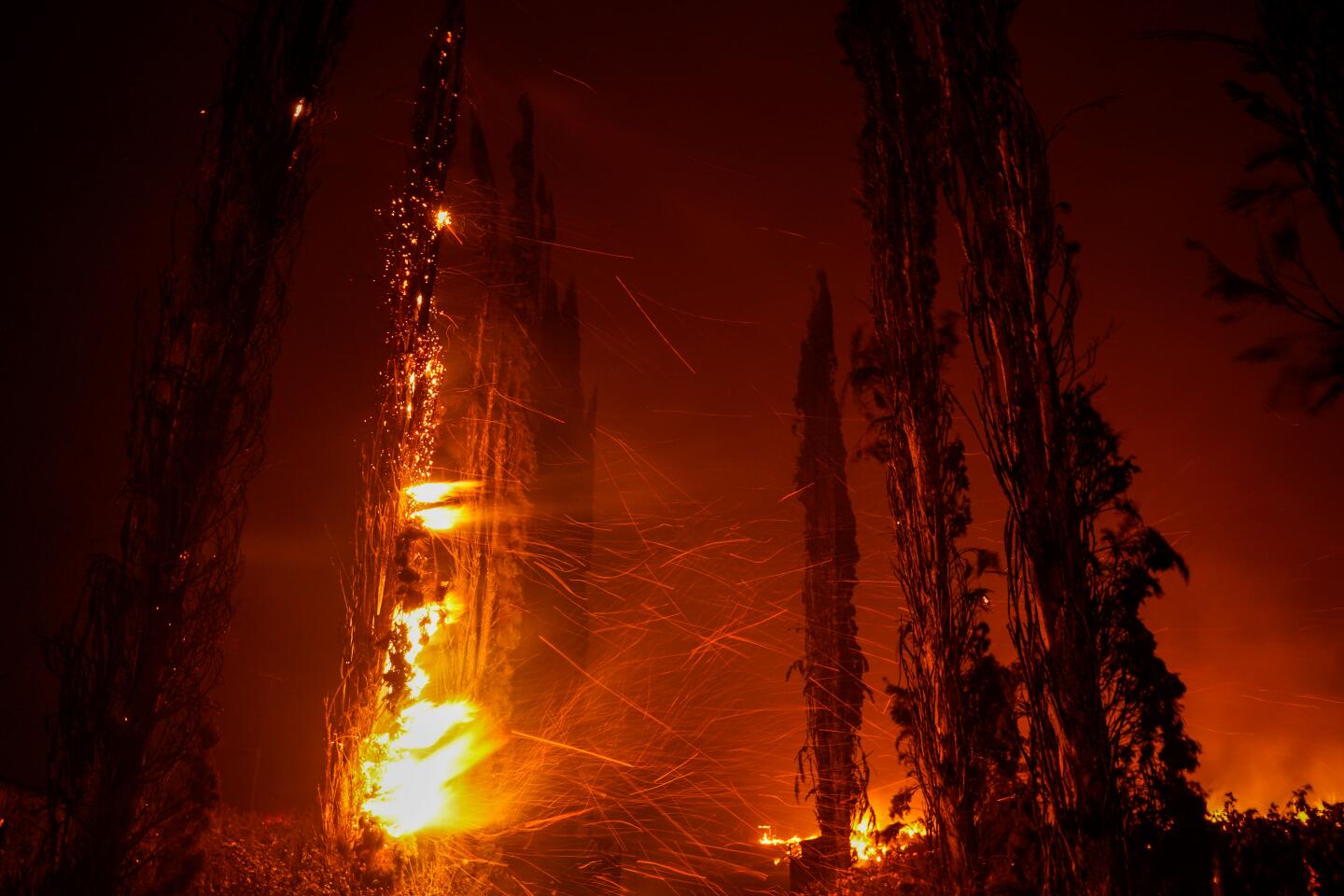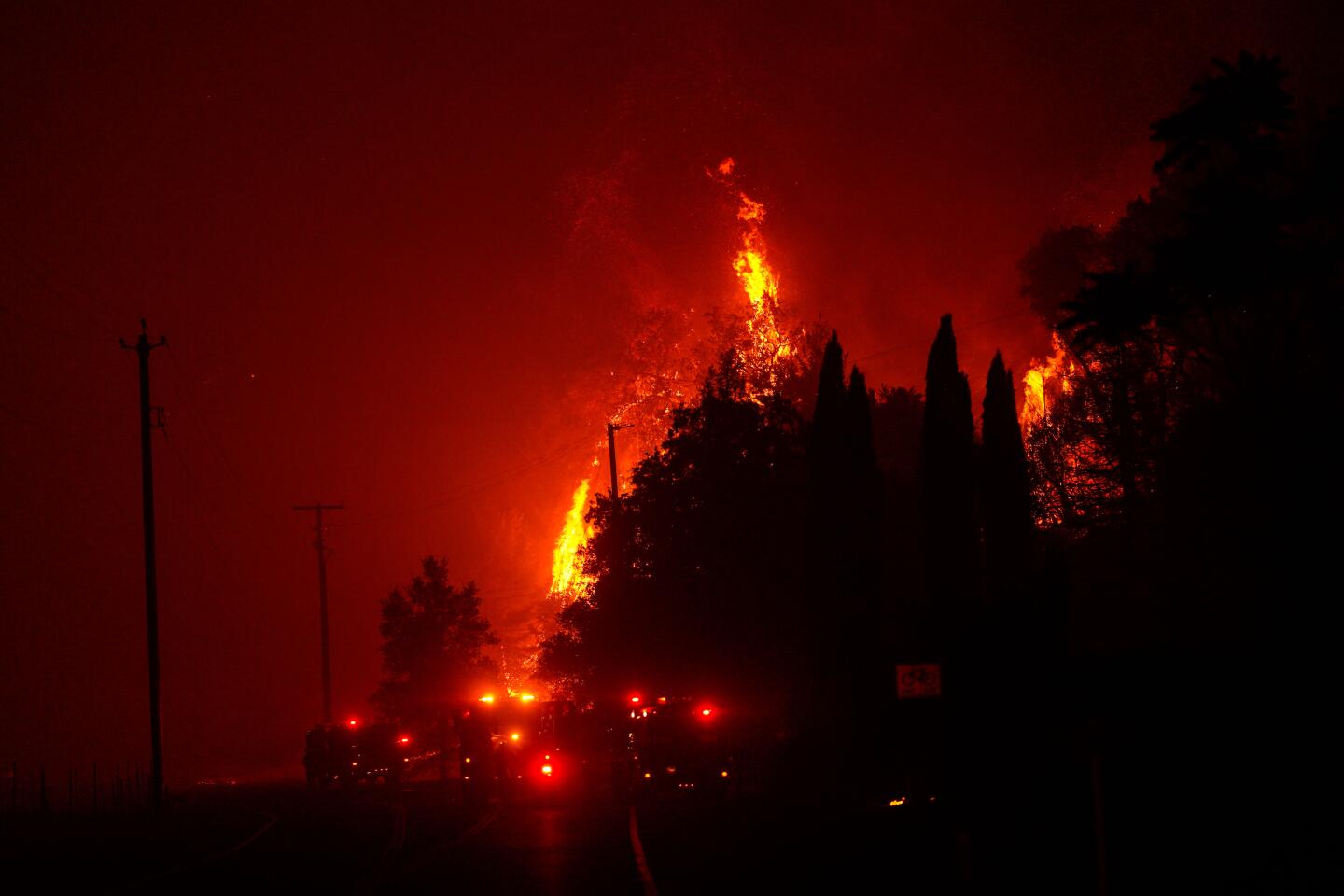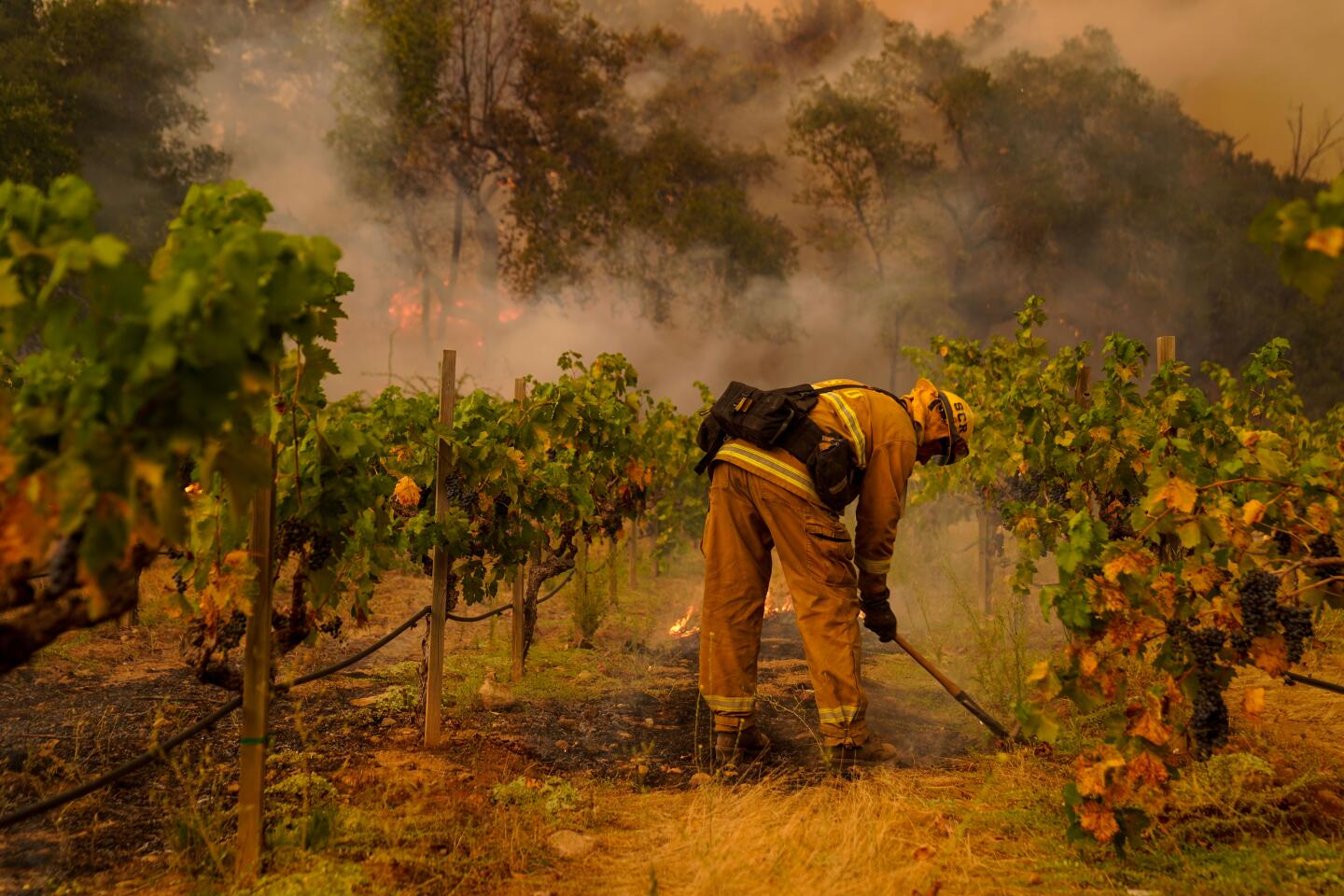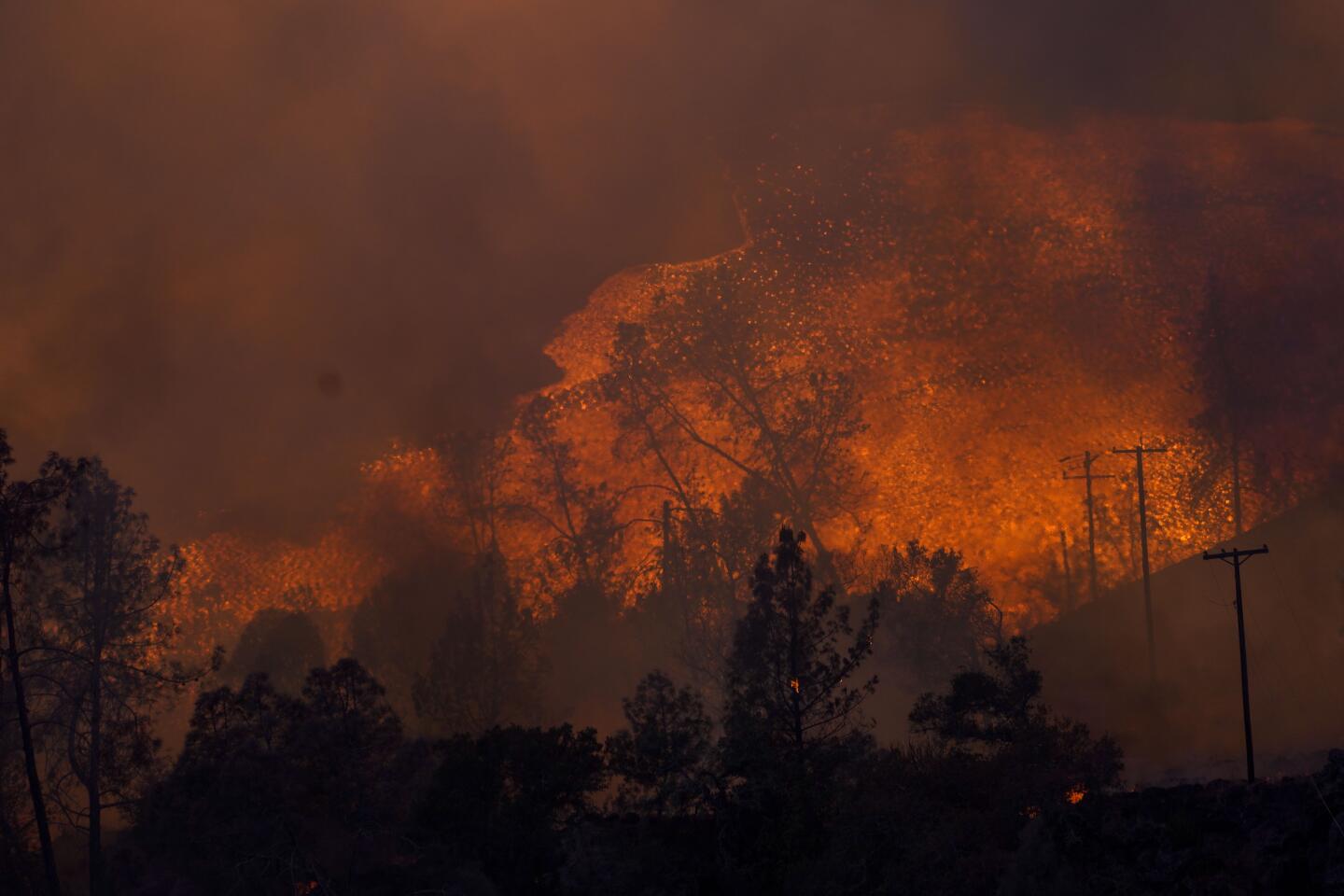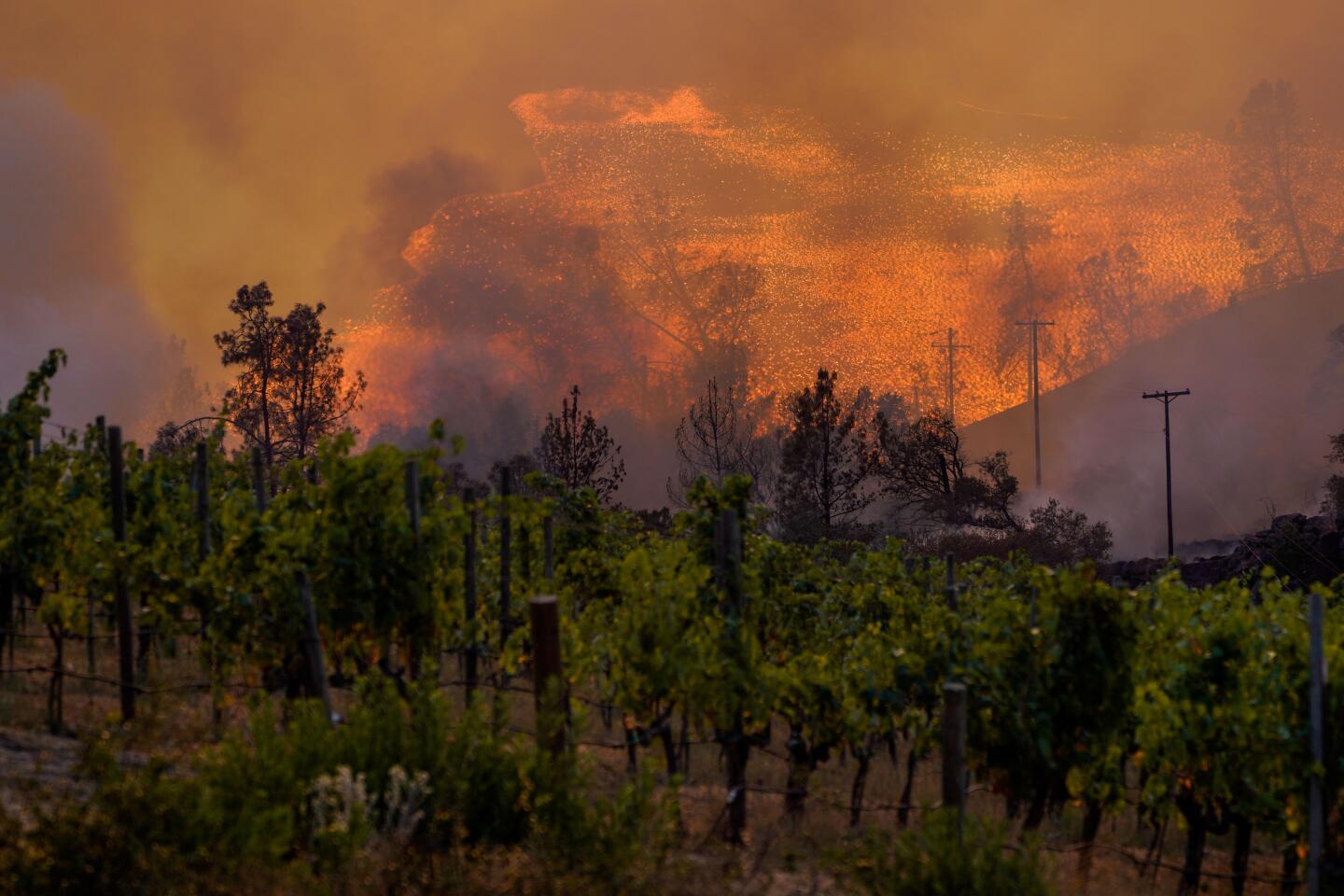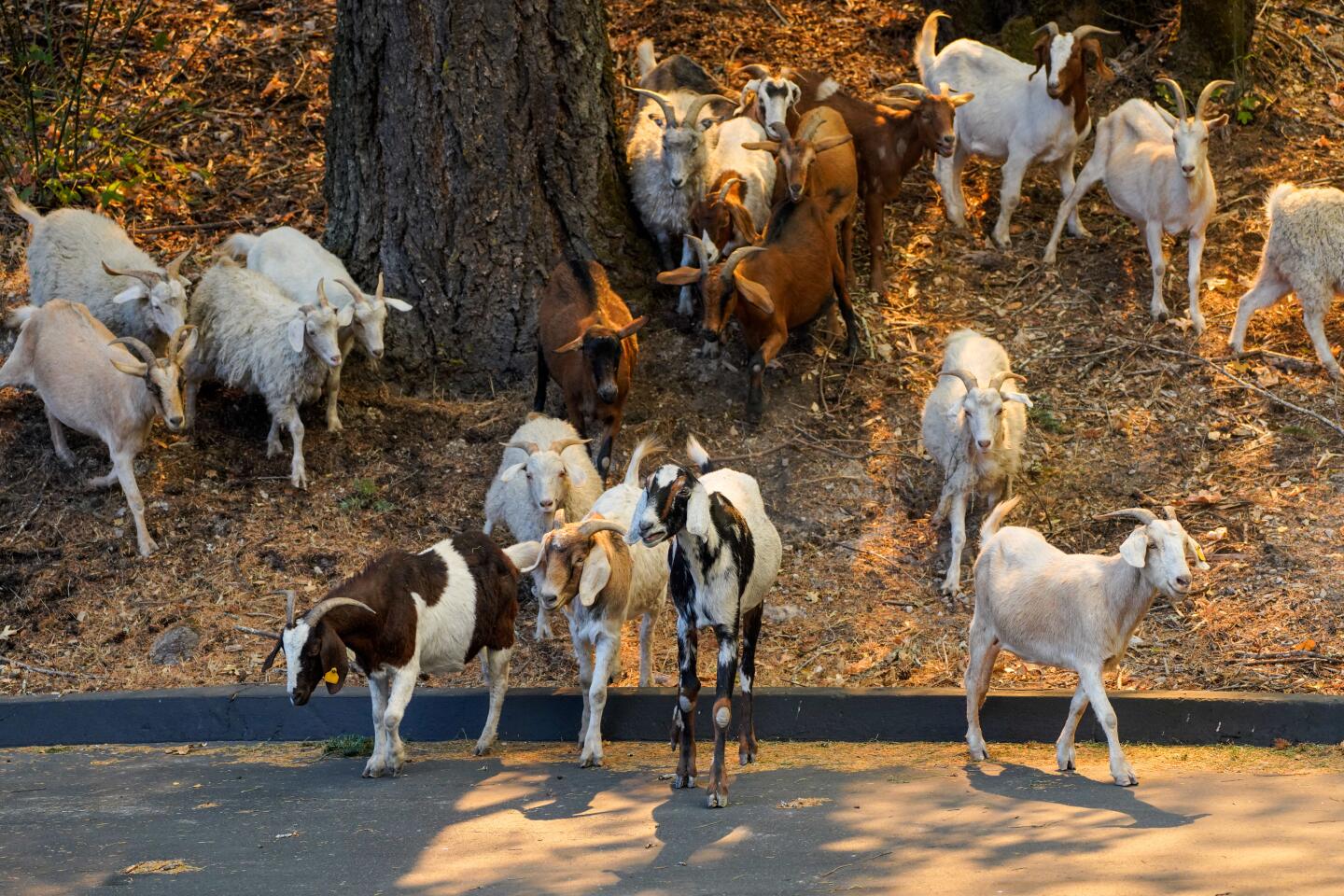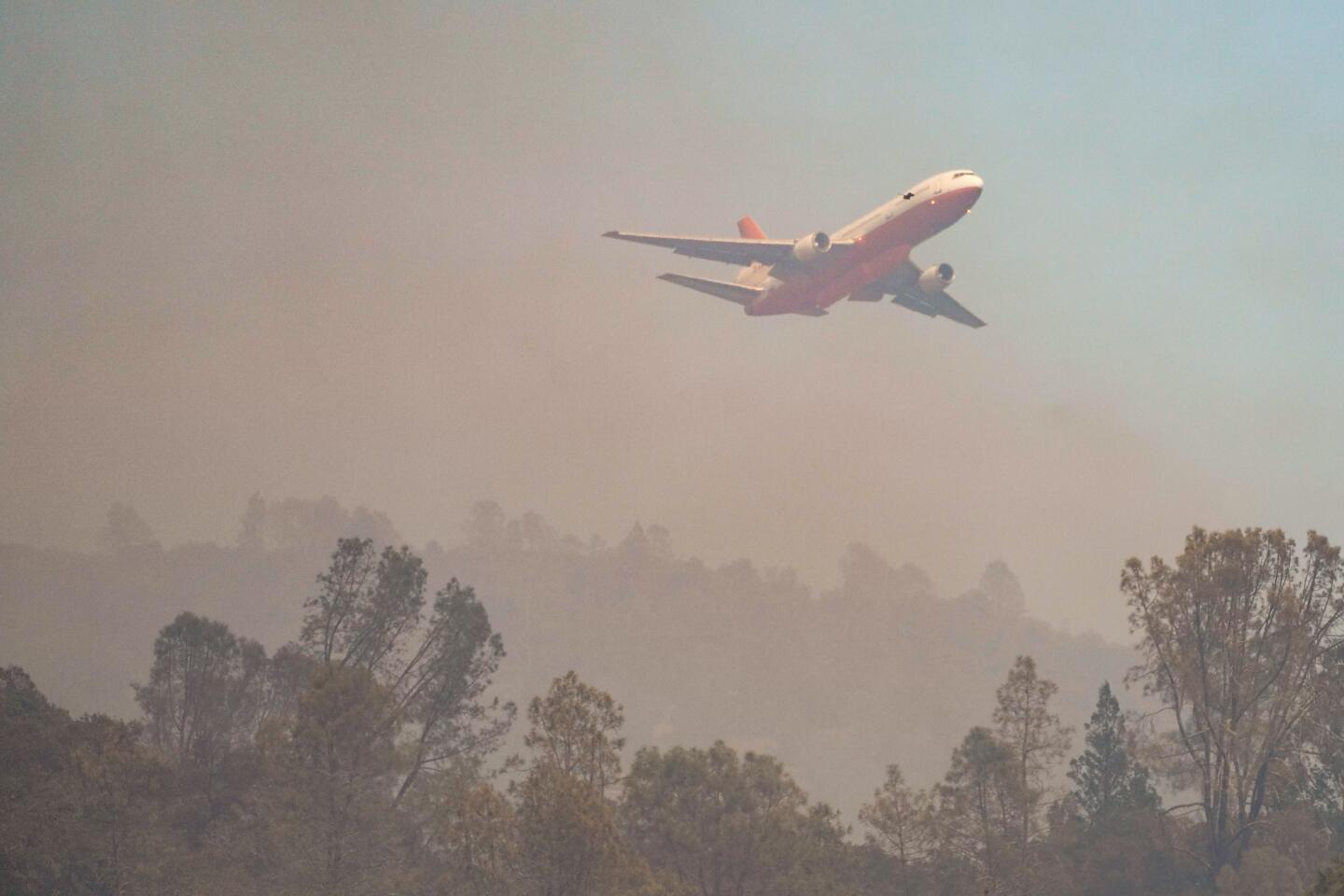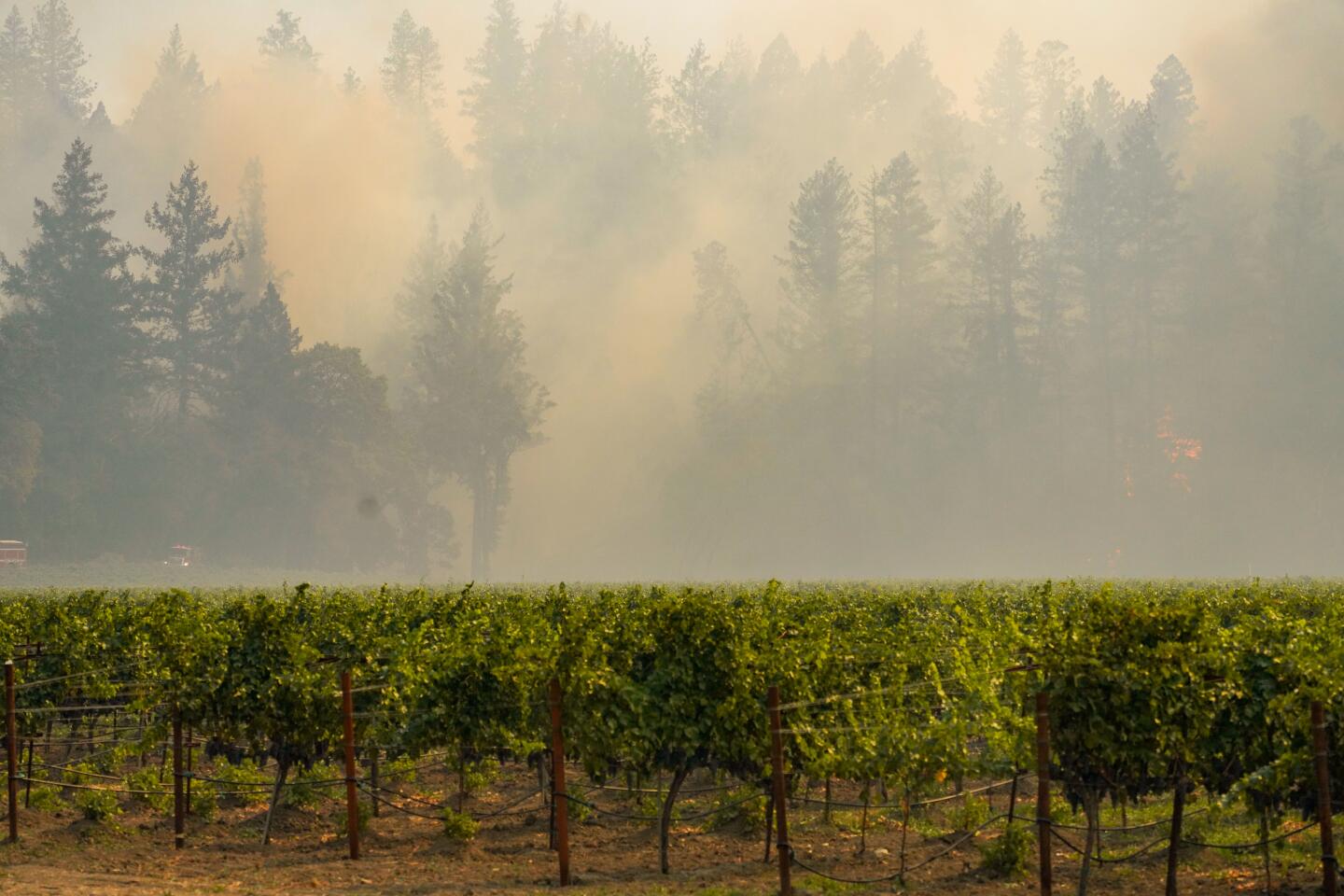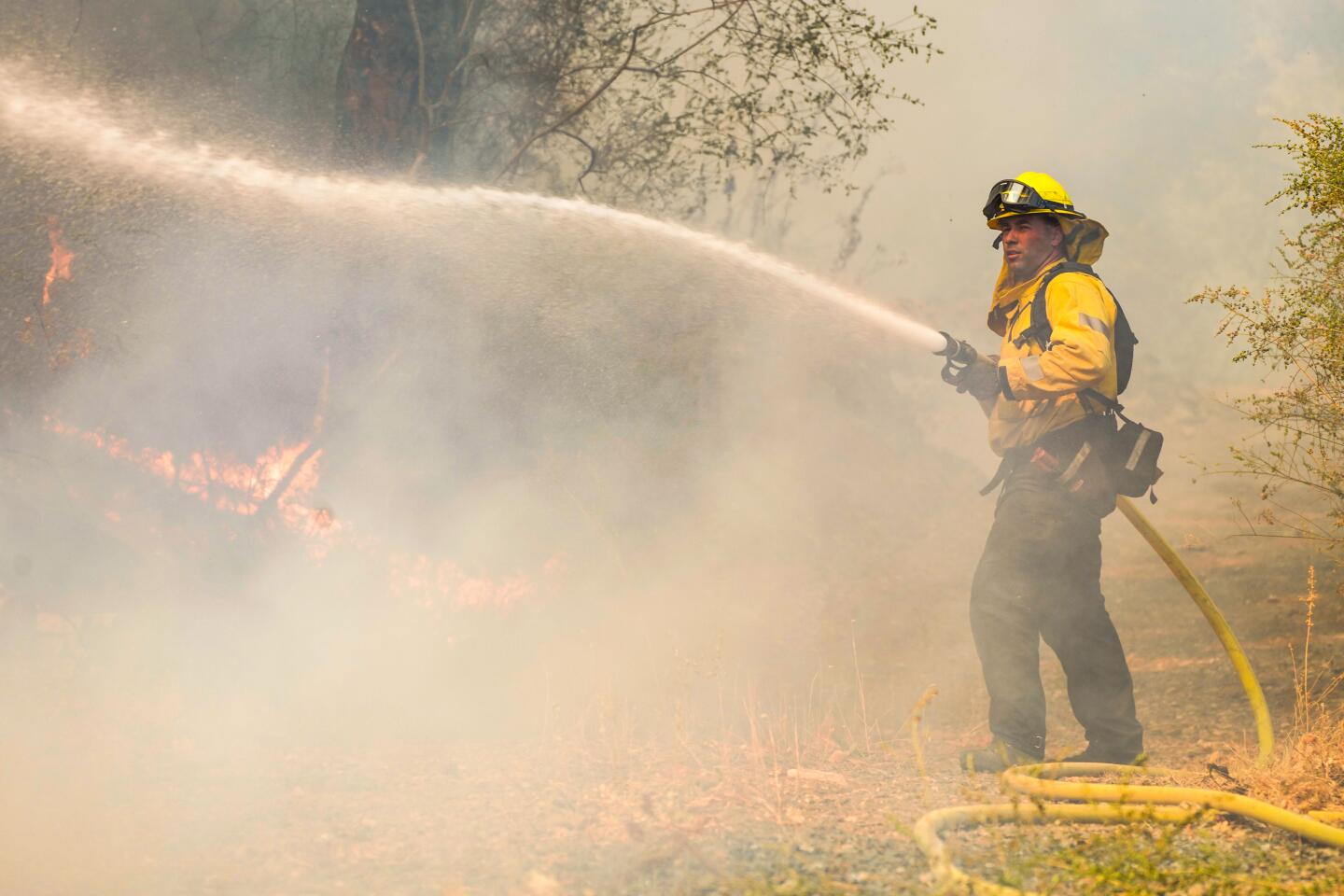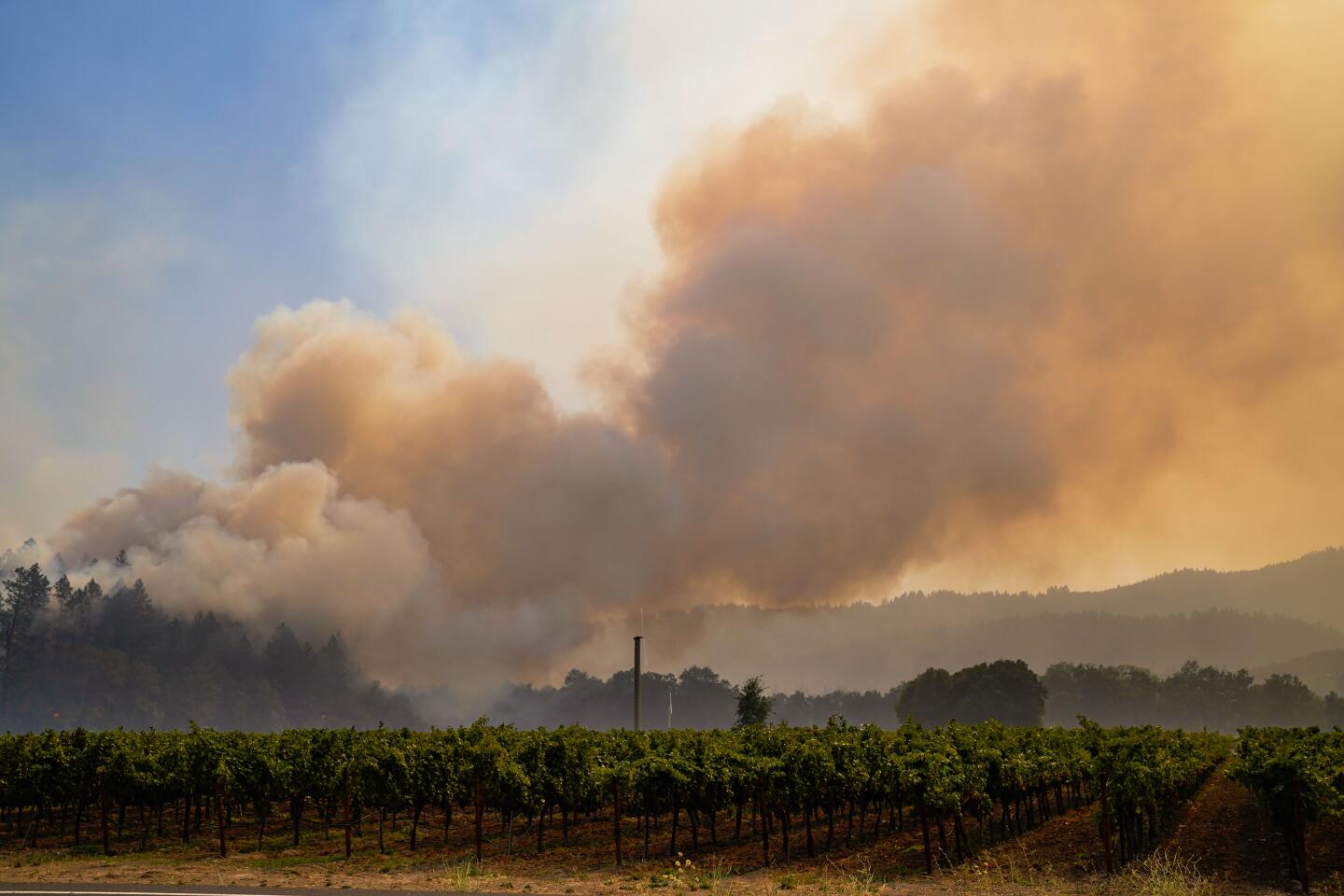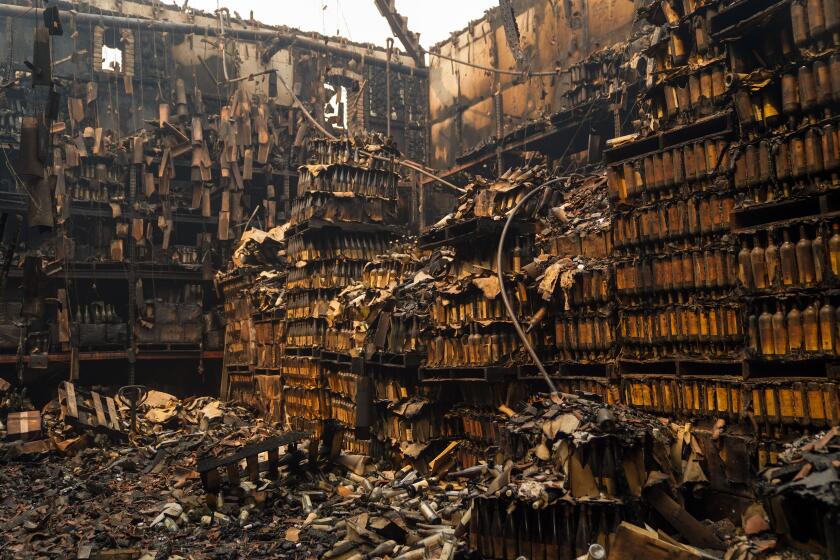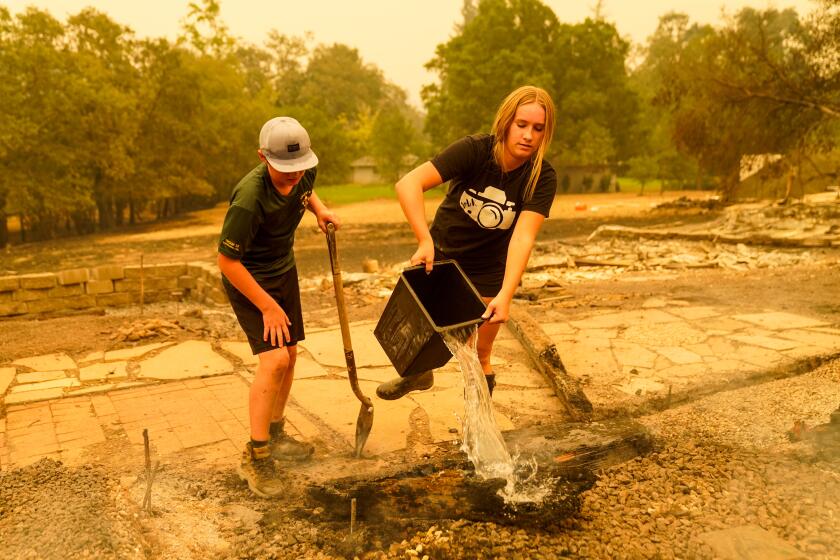Glass fire grows nearly fourfold in a day, burning 80 homes in Napa, Sonoma counties

The rapid spread of the nearly 50,000-acre Glass fire has raised concerns about the fate of the wineries in Napa and Sonoma counties.
- Share via
CALISTOGA, Calif. — At least 80 homes have been destroyed in Napa and Sonoma counties as the Glass fire continues to rampage through Northern California’s wine country.
The blaze had burned 46,600 acres as of Tuesday evening — nearly quadrupling in size since Monday morning — with just 2% containment.
The fire destroyed 52 residences in Napa County and 28 in Sonoma County, said Erick Hernandez, a public information officer with the California Department of Forestry and Fire Protection. Two commercial structures in Napa County have been burned.
Thousands of people are under evacuation orders as multiple fires burn unchecked in Napa, Sonoma and Shasta counties.
The fire burned rapidly Sunday through Napa Valley’s Silverado Trail, raising concerns about the fate of the area’s famed wineries.
Napa and Sonoma counties are home to more than 800 wineries, according to their tourism associations, and many are family owned.
One building that was lost was the distinctive stone structure at the Chateau Boswell Winery in St. Helena, which marked its 40th anniversary last year.
Officials said Monday evening that at least eight wineries were damaged.
The winding road to Chateau Boswell was flanked by smoldering brush and trees Tuesday morning as firefighters worked to quell the flames scorching the region.
Just off Silverado Trail, downed power lines and burned cars blocked one of the mountain paths to the winery, known for its Cabernet, Chardonnay and Pinot Noir.
The vineyard’s entrance was roped off by yellow sheriff’s tape. Singed cypress trees towered over the driveway that now leads to scorched rubble and earth.
California’s wineries in Napa and Sonoma are being hammered on multiple fronts. Vintners are growing weary.
Santa Rosa Fire Chief Tony Gossner said Tuesday that his department had called in all possible personnel to fight the Glass fire.
“Every available firefighter that could work came to work,” he said during a briefing, noting that crews’ top priorities for Tuesday are extinguishing the fire and maintaining perimeter control.
Of particular focus is the mountainous area between Calistoga and Angwin.
“We’re going to be in this for a couple of weeks,” Gossner said. “It’s going to be long, and it’s going to be painful for those that are dealing with it. So take a deep breath, take care of yourself and take care of your neighbors.”
Though Cal Fire officials could not immediately confirm the acreage breakdown by county, they emphasized that California’s wildfire-fighting infrastructure is “one of the strongest and most diverse in the nation.”
“This is a large fire,” Cal Fire Unit Chief Shana Jones said. “We’re at 42,000 acres covering two counties. That is a lot of territory, and it’s a lot of work.”
Once again, wind-driven flames tear through Santa Rosa, as wildfires besiege California’s wine country.
Although no injuries have been confirmed, tens of thousands of people have been forced to flee from the fire.
Sonoma County Sheriff’s Department spokesman Sgt. Spencer Crum said some 68,000 residents had been ordered to leave.
Authorities on Tuesday downgraded mandatory evacuation orders to warnings for areas that included Summerfield, Spring Lake and parts of the communities of Melita and Calistoga.
In Melita, about five miles east of Santa Rosa, evacuation orders were reduced to warnings for the area west of Calistoga Road, south of Melita and north of Montgomery Drive.
The entire city of Calistoga, with a population of slightly more than 5,000 people, was ordered to evacuate Monday evening; authorities scaled back the order to a warning for the area west and north of Mountain Hawk Drive between Highway 12 and San Ramon Way, as well as the area west of San Ramon Way.
Evacuation orders remain in place elsewhere in Calistoga, and on Tuesday evening, authorities ordered residents in an area southeast of Calistoga to evacuate from an area west of State Route 29, extending to the Sonoma County line and bounded by Diamond Mountain Road and Petrified Forest Road.
Evacuation orders remain in place for the hills on both sides of the northern Napa Valley, flanking Calistoga and St. Helena, and parts of the east side of the Silverado Trail.
Officials have urged residents to comply with those directives — saying some of those who refused to leave had to be rescued from their homes later, placing further strain on law enforcement and public safety personnel already stretched thin by California’s historic fire season.
“The dynamics of climate change, the dynamics as it relates to the lack of forest management over the last century, have created ... real concern as it relates to the spread of these wildfires in ferocious ways,” Gov. Gavin Newsom said Monday.
Newsom has declared a state of emergency in Napa and Sonoma counties — as well as Shasta County, where the Zogg fire has burned more than 40,000 acres and killed three people.
The governor has also requested a disaster declaration from the federal government, which would bring increased aid to Los Angeles, Fresno, Madera, Mendocino, San Bernardino, San Diego and Siskiyou counties.
The Glass fire is the latest to besiege Northern California’s wildfire-weary wine country.
Dozens of people were killed and more than 9,000 structures were lost in 2017, when fires swept through Santa Rosa and surrounding communities. Last year, the Kincade fire menaced the region for weeks, putting nearly 100,000 people under evacuation orders. More than 50% of Lake County to the north of Santa Rosa has burned in the last decade.
Sonoma County Sheriff Mark Essick said that “we are all dealing with significant fire fatigue.”
“This is the fourth major fire in our community since 2017,” he said Tuesday. “Many people are feeling the effects, and many people are evacuating and have evacuated multiple times.”
Fire stormed through California’s wine country Sunday night, destroying numerous homes and forcing thousands to flee, including in areas devastated by the Tubbs fire in 2017.
For many, the latest fire carries with it an unwelcome wave of memories: the terror of having to evacuate and the uncertainty of not knowing whether their homes were spared from the flames.
“The Tubbs trauma is real,” said Rincon Valley resident Randi Cornwall, referring to the 2017 fire that devastated the region. “When you have seen fire move fast before, you know to get the hell out before traffic backs up and fire is licking at your cars.”
Some, however, were hesitant to flee. Monday morning, Ben Illia stood in the frontyard of the gray ranch house where he grew up. He was watering down the landscape with a hose.
A veteran of the Tubbs fire, he had no plans to leave unless “I see flames coming over the hill,” he said.
Tucked into the hillside off Highway 29 in Calistoga, a young man reached for a thick hose attached to a water tank at the back of his truck and doused the spot fire licking the brush around a neighbor’s home.
The man, who declined to give his name, said he lived about a mile away and had defended the area from flames in the past. Dressed in a T-shirt, with a cigarette resting between his lips, he waited for his water tank to refill, then aimed the hose at a tree that had caught fire.
Other residents had fled from the home behind him after hanging a tag that read “EVACUATED” in red letters.
Down below, at the edge of the highway, Joe Ortega watched the flames char a parcel of land that he said a real estate agent he knows had put up for sale. Burning trees crackled behind him.
The 61-year-old said he had been checking on friends’ and family’s houses and properties since 4:30 a.m., when he made the rest of his family evacuate from their Calistoga home.
Ortega said he planned to head back into town later in the day to hand out Red Bull and water to firefighters.
“I’m a rebel,” he laughed as fire engines whizzed by.
Parvini reported from Calistoga, and Money and Smith reported from Los Angeles.
Times staff writers Anita Chabria, Paige St. John, Maura Dolan, Marisa Gerber, Joseph Serna, Matthew Ormseth and Rong-Gong Lin II contributed to this report.
More to Read
Sign up for Essential California
The most important California stories and recommendations in your inbox every morning.
You may occasionally receive promotional content from the Los Angeles Times.
